

Why it’s hard for students to “just turn in” missing assignments, and how to get them unstuck
Mar 29, 2023 | Blog
With the end of the semester on the horizon, many students may feel overwhelmed by low grades or feeling behind in some of their classes.
As a parent, it can be stressful to see that your student has overdue work, or get notifications from their teacher that they’re missing assignments.
It’s even more frustrating when you’ve told them over and over again how important it is to “just turn it in”…but the work is still showing up as missing.
The reality is that no matter how simple it might seem to an outside observer, doing missing work is almost never as easy as “just getting it done.” If they haven’t done the work yet, there’s a good chance that something is getting in their way.
If you can figure out what the problem is before jumping in to help them (or make them) do the work, you’ll dramatically increase your chances of success.
In our experience, there are usually 3 main reasons students resist submitting their missing work…even when it seems like “just turning it in” would be SO much easier!
Reason 1: They think it won’t make a difference
Once the due date for an assignment has passed, students often de-prioritize it and move on to focus on upcoming assignments instead. It’s tempting for students to justify this by thinking “there are lots of other assignments, missing one or two won’t matter.”
But what they often don’t realize is that because of the way most grading scales are weighted, even one or two zeros can have an enormous impact on their grade. Showing students the difference it makes to turn in just a few assignments can increase their motivation to get the work done.
Here’s an example of the difference it can make to turn in just a few missing assignments before the end of the semester:
Overall grade with 3 missing assignments: 78.3%
Overall grade when assignments are turned in: 90.1%
It’s hard for students to calculate these averages in their head, so it can be really powerful for them to run the numbers and see firsthand exactly how much they have to gain from making up their missing assignments.
When we do calculations like this with our students, they are almost always surprised by how much this makeup work could improve their grades, and feel much more motivated to submit the assignments when they can see for themselves the difference it will make.
Reason 2: They think it’s too late
Another reason students often resist doing makeup work is that they think it’s too late to get credit for it.
Even if they’ve done the math and know that submitting the work would make a difference in their grade, they still won’t want to turn it in if they think the teacher won’t accept it.
Especially for introverted or anxious students, it can be very intimidating to have conversations with their teachers. They might think they’ll get in trouble for asking to submit their work late, or worry that the teacher will say “no.”
The good news is that many teachers are flexible with their late work policies and allow students to turn in overdue assignments even when it is past the “official” deadline to submit them.
So if students can find the courage to ask for help, there is a good chance that their teachers will respond positively and allow them an opportunity to make up the work.
For students who are struggling to reach out to teachers, we often find it is helpful to roleplay these conversations in coaching sessions if they’re not sure what to say, or work with them to email their teachers if they’re not sure what to say.
Reason 3: They feel overwhelmed
Students who are behind on their work often have challenges keeping track of due dates, managing time, breaking down complex assignments, prioritizing work, staying focused, or following through with plans….which is why they fell behind in the first place.
These challenges can become even more daunting when they are behind in their classes, and trying to complete makeup assignments on top of their normal workload.
This can feel so stressful that a lot of students avoid or put off doing makeup work even when they know how much it would improve their grade.

For these students to get their work submitted, it’s essential to help them find ways to…
- Break down the assignments so they have a realistic plan for getting the work done that they’re confident they can actually follow through with
- Lower the stress they feel while they are doing the work so they will be less tempted to avoid it
- Visualize the progress they are making so they can see that their efforts are making a difference
Providing support
When students have a lot of makeup work to complete, having some additional support to help them work through it can be invaluable.
For some students, this may mean finding a tutor to help them with the content they didn’t understand when their teacher was first presenting the material.
For other students, having a family member or friend nearby as a source of moral support to keep them company while they are working (and a motivating reward to look forward to as soon as the work is completed) can be enormously helpful.
Other students may benefit from working with an academic coach to help them get unstuck and started on their missing work. Sometimes, having someone else who is not a family member step in to help can reduce stress and conflict at home and make it easier for students to take the steps they need to get back on track in their classes. If you think this type of support would be helpful for your student, please feel free to reach out and we’ll be happy to help!

Missing assignments and what to do about them
- January 6, 2022
- Classroom Leadership , Growth , Missing assignments , Student Motivation
Have you ever looked at your grade book and been frustrated by the number of missing assignments? Zeros obviously have an adverse effect on student grades. To address this issue, there has been a lot of discussion about changing the way we grade or limiting the amount of homework given. These discussions should take place but I don’t want argue the pros and cons of those ideas. However, I do want to address the fact that we are ultimately concerned with students showing mastery. Missing work can make this challenging.
We (the adults) can adjust our thinking and strategies regarding missing work, however the constant truth is that mastery is the ultimate goal. For most students, it is going to be challenging for them to show mastery on assessments if they don’t complete the tasks and assignments that preceded the assessment. Why? Because there is a certain feedback loop that should take place between student and teacher before the student even attempts an assignment.
During my time in the classroom I did not find the magic bullet to solve the issue of students not turning in assignments. Zeros filled my gradebook with empty cells highlighted in yellow. However, I will share with you some things that helped me find some success in this area.

1. Talk to the student with the goal of problem solving
The problem ultimately is owned by the student. Keep this in mind and prevent yourself from burning out (I wish I learned this lesson earlier in my career). By listening to the student with the goal of helping them solve their problem, you are in position to offer valuable feedback. Feedback leads to potential adjustments that need to be made by the student. When students adjust based on feedback, they find opportunities.
2. Suggest a planner or digital organizer
Planning for the responsibilities and tasks that life will throw your way is a wise thing to do. Convincing students of this can be challenging. At the high school level, I have found it very difficult to get students to use a planner. I have had some success getting them to use apps. Currently, I use the To Do app by Microsoft and I highly recommend it. At the beginning of each day I sit down and type out all my goals (tasks) for the day. The ones that I complete, I make disappear and the ones I don’t can carry over to the next day.
3. Help the student discover their “Why”
My experience has taught me that students who don’t understand why they go to school tend to struggle keeping up with their school responsibilities. They may say the right thing regarding why they go to school but their missing work reveals something unspoken. You can help your students commit to excellence by helping them discover their “Why.” This revelation can lead to more motivation on the part of the student. Figuring out the “Why” can take some time but starting the conversation and helping the student begin that journey is very important. Here’s something that I would ask students to get started: What is it that you want to do in this world to make it better place for yourself and others?
4. Celebrate Progress
Sometimes, words of affirmation are what students needs to adopt habits that lead to work completion and submission. If you have a student how do used to accumulate a lot of missing work and is now making an attempt to change those habits, celebrate in a big way. Make sure the praise isn’t superficial, but identify specific things that you notice students doing differently. Praise tends to yield more of the desired behavior because students feel good when they receive it.
Missing work can be frustrating and can add extra tasks to your to do list. It can be especially frustrating if you aren’t getting support from parents or administration. Throughout it all, I encourage you to never give up. Remember that you can’t control the student and make them do the assignment, but you can help them problem solve why missing work is a challenge. Like all great teachers, we exhaust all of our tools, get some more and keep trying. You’ve got this.
Enjoying the content? Please consider partnering with us to spread the message with a donation via PayPal.
Please subscribe to our newsletter to sharpen your classroom leadership skills and get updates delivered straight to you.
- More Networks
Best Back to School Ideas 🍏

End the Unfinished Work Battle: Catch-Ups and Pickles
Share this post:.

Are your students struggling to complete their work? Up to your eyeballs in missing or unfinished work assignments? Then you might need to institute a “Catch-up and Pickles” routine in your classroom as a way to win the missing or incomplete work battle! This is seriously my favorite unfinished work routine!

A few weeks ago, I posted a Reel on Instagram about some of my more “controversial ” grading practices. Between you and me… they really aren’t that controversial… just good teaching! But folks LOST THEIR MINDS! And honestly, it shed light on a bigger problem: the struggle of incomplete work.
Controversial Grading Practices
You’re probably wondering what those controversial grading practices were. I’ll let you watch the IG Reel to see all three, but the one that had most teachers up in arms was the belief of not putting anything less than 50% in the grade book.
This one line led to me being called many things, but most teachers asked, “What about missing or incomplete work?”
To which I responded that I rarely struggled with incomplete or missing work. I can think of one time I had to put a zero in the grade book because of a missing assignment – ONCE – in 13 years of teaching. Those are some pretty good odds!

Unfinished Work Routine
So, how can this be?
First, let’s clear up some things:
- No – I didn’t have perfect students who completed every assignment without asking.
- No – I didn’t work at fancy schools with high volumes of parents involved who made sure the work was completed at home.
- And, no – I didn’t work myself to death chasing down students.
I rarely had missing or incomplete work because I planned time in my week for students to work on missing or incomplete assignments.
Today, I’m sharing this simple yet HIGHLY effective routine that basically eliminated the struggle to get students to complete missing or incomplete assignments.
This magical weekly routine that solves the missing work problem is fondly called, “ Catch-up and Pickles. ” But, that’s really just a fancy name for a time set aside on a Friday morning so students can work on unfinished work.
What is Catch-Up and Pickles?
I shared about this concept a while ago in my “Small Group Time Exposed” post , but I feel like after all the hoopla that Reel caused, it warranted its own place on the blog!
Each day, I had 60 minutes of time built into my schedule for small group rotations. That worked great Monday through Thursday. But, I noticed that Fridays were a bit cramped. Not only did we have our spelling and vocabulary test that day but we would also have a reading comprehension assessment. Time is needed to complete all these assessments, and that ate into a portion of our small group time.
Rather than try and stuff the small group instruction into the 30 minutes that were left after completing everything else, I decided to transform that awkward time slot into productive work time.
So at the end of the week, instead of formal center rotations, I did a “Catch-Ups and Pickles” routine. Students who had not finished their work used this time to “Catch-Up,” while those who were done were allowed to “Pickles” a reading-based activity to complete.
For students, this time was dedicated to completing their work or choosing a preferred activity to complete.
For the teacher, this routine provided time to reteach lessons, pull students for assessments , or conference with students one on one.
And let me just say… this was a wildly popular time in my classroom!
How to Find Time?
So the big question here is, how do you find the time? Everything you are required to teach in a day leaves very little time in your schedule for “makeup work,” but like I shared before… I was able to find time by reallocating the time I was using for reading centers. It wasn’t working for us on Fridays, so we changed it up.
I suggest you take a look at your schedule. Do you have some awkward or weird times?
I like the idea of doing Catch-up and Pickles on a Friday, so it’s easier to track the work that needs to be completed. But maybe Fridays don’t work for you. Look for a block of time (at least 20 mins!) and see if it works. If it doesn’t, restructure or choose a different time. This could even be something you do at the end of a unit in reading or math or on the last school day of the month.
Warning: I wouldn’t do this one day a quarter… that’s too big a chunk of time to complete everything. Doing that is like saving all your laundry for a month and trying to do it all in one day. Someone will get overwhelmed, and it’s not going to get done.
How to Get Started with Catch Up and Pickles
Once you’ve found your time, it’s time to plan the “Catch-Up and Pickles” activities.
In my classroom, I allowed students to “catch up” on any work, whether it be math, reading, or something else entirely. You need to select what students will be working on. Maybe it’s just reading, so you do only reading makeup work.
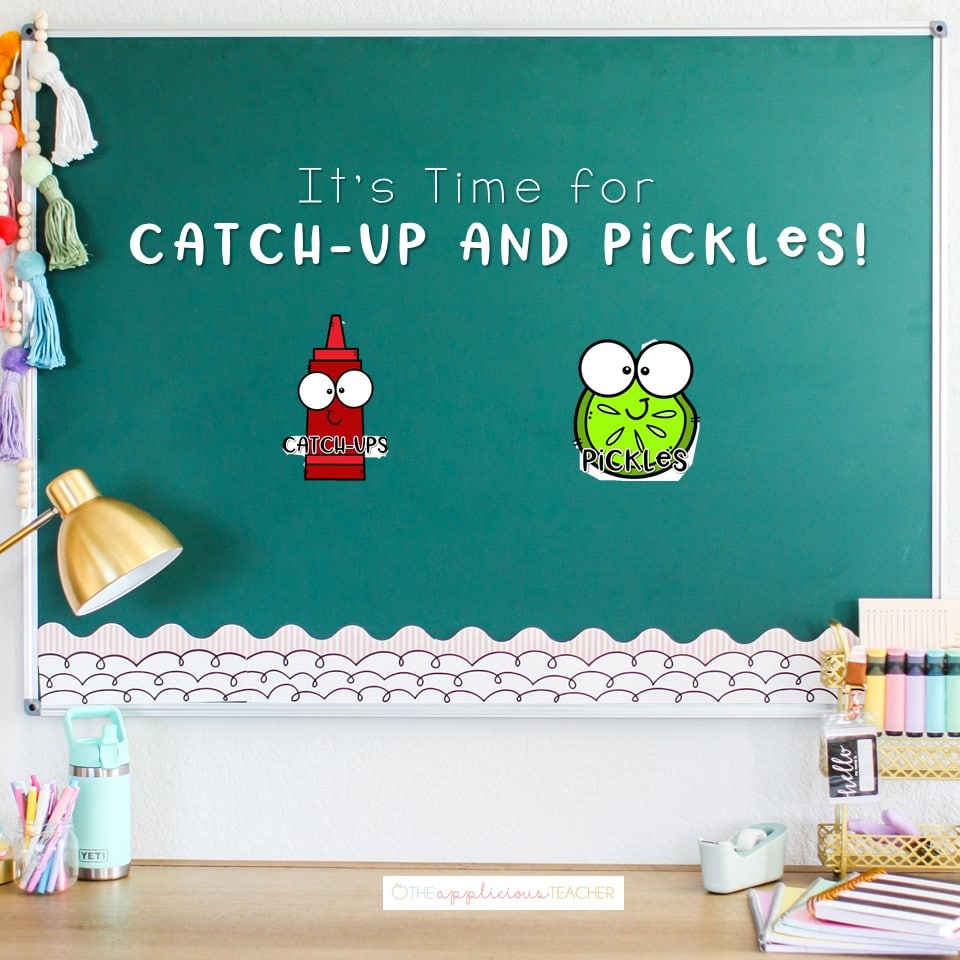
Whatever you decide, be specific. The unstructured nature of this routine means that chaos could happen at any minute. Being clear on what students should be working on at this time (and reinforcing it each time you have a Catch-up and Pickles session) can help keep the crazies at bay.
Who is a Catch-Up and Who is a Pickle?
From there, you’ll need a system for knowing who is a “catch-up” and who is a “pickle.”
Right before we started, I’d scan my grade book for any missing assignments. Those students with missing work would go on my “catch up” list.
Another way I identified students was through their “Unfinished Work” folder. Any classwork that didn’t get completed went in there (not tests or quizzes, just classwork). Right before we’d begin, students would pull out their folders and check to make sure there wasn’t any work that needed to be completed. If there was, they were on the “catch-up” list.
Let me just say, just even having an “Unfinished Work” folder helped a great deal with handling incomplete work! It was much easier for students to keep track of their work. If they finished an assignment early, they could either grab a book to read or work on unfinished work from their folder. The finished work folder lived in their desk, and I always told them, “If you aren’t done, put it in your finished work folder!”
You can read more about the unfinished work folder here !
I kept this routine real simple, guys! No fancy slide shows…just a whiteboard and names. In one column, I’d write “catch-up” with the students’ names and a list of work they needed to complete. In the other column, I’d write “Pickles” with the names of students who had completed all their work. When a student completed assignments and turned them in, they could erase their name and put it under the “pickles” side instead.
Activity Idea for Pickles
Now, remember, the name of any student who had completed all their work or their I-Ready minutes would be placed in the Pickles column.
My students loved being a pickle! They loved the idea of choosing their own activities (even if they were reading-based).
Some activities my students could pick from:
- Writing and illustrating stories – Pretty popular! Especially the illustrating. I showed students how to make a mini-book with lined paper folded and stapled together.
- Playing an educational computer game – Probably the most popular!
- Creating or playing on the IPad – Don’t worry, I was very clear about which apps they could use during this time!
- Completing a reading center game – Students could do this with their friends. I’d put any stations we had completed that week in an area towards the back of the classroom, and students could grab one to play. This also worked well for any student who needed to complete a station activity for their “catch-up” activity. Need reading center ideas? These were always a hit !
- Free choice reading – They could choose their own book and where they’d like to sit and read. They could also read with a buddy.
- Helping a friend complete their work – This one was pretty popular! I allowed it as long as they weren’t just telling their buddies the answers. Honestly, it was a win-win: The student got help, and the student helping was learning more! Bonus- it freed me up to complete DRAs, fluency checks, or reteach skills as needed.
- Teacher assistant – Sometimes I needed help, so if they were done and didn’t want to do one of the other activities, I’d put them to work, helping to organize papers or filling the mailboxes with returned work.
Unfinished Work Routine- Catch-up and Pickles
So there you have it, teacher friends. This is the simple, routine way I kept my students on top of their work. I mean, what teacher wants to feel like they are constantly chasing students around trying to get them to finish their work? NOT ME! Now you don’t have to!
Free Catch Up and Pickles Download
Want to grab a few resources to help you get started? Click below and have this resource sent straight to your inbox! Now you can easily implement a Catch-up and Pickles routine in your classroom this week! This free download includes printable tracking sheets, whiteboard labels, and an editable PowerPoint file.

More Great Ideas!
Check out these other great ideas to try in your classroom!
- 5 Tips for Dealing with a Chatty Class
- How to Organize Your Google Classroom for 2nd Grade
- Help Students Take Ownership of Their Learning without a Data Notebook
- End of the Year Survival Tips
- Categories: Classroom , Classroom management

Hi, I'm Leigh.
The Applicious Teacher is all about creating hands-on and engaging lessons that align with the standards while still having time for your life. This is your place for ideas, tips, and resources for the REAL teacher!

Recent Posts
Popular in the Store
You may also enjoy...

Valentine’s Day Glitter Slime: Strawberry Glitter Slime for the Classroom!

Cyber Monday Sale!

Creative Organization Solutions for Teachers

© 2021 The Applicious Teacher. All Rights Reserved
Designed by Ashley Hughes
Use of Cookies
Privacy overview.
| Cookie | Duration | Description |
|---|---|---|
| cookielawinfo-checbox-analytics | 11 months | This cookie is set by GDPR Cookie Consent plugin. The cookie is used to store the user consent for the cookies in the category "Analytics". |
| cookielawinfo-checbox-functional | 11 months | The cookie is set by GDPR cookie consent to record the user consent for the cookies in the category "Functional". |
| cookielawinfo-checbox-others | 11 months | This cookie is set by GDPR Cookie Consent plugin. The cookie is used to store the user consent for the cookies in the category "Other. |
| cookielawinfo-checkbox-necessary | 11 months | This cookie is set by GDPR Cookie Consent plugin. The cookies is used to store the user consent for the cookies in the category "Necessary". |
| cookielawinfo-checkbox-performance | 11 months | This cookie is set by GDPR Cookie Consent plugin. The cookie is used to store the user consent for the cookies in the category "Performance". |
| viewed_cookie_policy | 11 months | The cookie is set by the GDPR Cookie Consent plugin and is used to store whether or not user has consented to the use of cookies. It does not store any personal data. |

Enter your keyword
- Academic Success
What’s the big deal if I don’t do an assignment or lab?
- January 14, 2015
Taking an online course seems so much easier than trekking to campus every week to sit in class, but it isn’t! Without dedicated classroom time, you are always pressured to “carve out” time from your busy schedule to get your work done in each class that you are taking. Online students must have a lot of self-discipline to make sure that each week they set aside time to go online and get their work completed.
One area that can trip up even strong students is when an assignment is missed and you think “That’s no big deal, I have an A average already”. But missing even one assignment can wreck your grade average for that category. For example, in one online class we had a special project that involved recording a job interview. Some students completed it quickly, but others had delays due to finding time to meet with their interviewer, or they had issues with the technology. Those students got a zero on the assignment because they failed to turn anything in on time.
Three students with a high “A” average then had low “C” averages with the missing assignment. For example: before the missing assignment a student’s grade average was 95 for the assignment category, but with a zero for the missing assignment, the grade average dropped to 77. That is a two letter grade drop just from missing one assignment.
Assignments, labs, and discussion boards are things directly under your control – you pick the time to complete it, and you have resources to use to complete the work. It is important to maintain high averages in those areas you do control in order to give you a cushion for a quiz or exam score that may not be as great as you wish.
Discussion board postings are another category where students may not realize the impact of not doing the weekly work. In an online course, the discussion board postings are the equivalent to raising your hand and participating in class. Which means this category is time sensitive and if you miss it – you can’t make up the work.
So how much are those discussion board posts worth to your final grade? You can see the categories of grading by looking at the syllabus for the class. In the syllabus it will indicate what type of work will be graded and the “weight” of that category. For example, if a discussion board category is given a weight of 25% that means that all your work in discussion board postings will be averaged, and that final score then represents ¼ of your final grade! The larger the weighted percent, the bigger the impact that category will have on your final grade.
Patt Peterson, HIT Online Program Coordinator

Top 10 Strategies For Catching Up on Missed Schoolwork and Ending The Year Successfully
It’s that time of year when many of the sessions in my private practice involves a discussion with my child or teen clients about strategizing ways to catch up a long list of missed assignments and end the school year successfully.
As a child psychologist and Modern Parenting Expert, I’ve unfortunately seen this scenario play out with many of my clients every year and it breaks my heart. It makes sense that many kids find themselves overwhelmed by late work in the second half of the school year. The first half of the year takes off slowly, allowing the child or teen to ease on in to homework, projects, and the material. Then, Christmas break happens and the child gets used to a slower pace for a while, and then January hits with a BANG!
Teachers mean business after the holidays are over. There is no more easing into the material and work, and the expectations are very high when it comes to producing work. In addition to this less-understanding attitude of the teacher, the academic material naturally becomes more complex and intense too. This scenario oftentimes creates a situation where it becomes very easy for kids and teens of become overwhelmed by the new demands of the second half of the school year.
But I have good news for you: even if your child is SUPER behind in their schoolwork, they can still end the school year on a positive note (and pass all of their classes!) by using the 10 strategies below. These are the same exact strategies that I use with all of my private practice clients, and I’ve seen many families rejoice with relief at the end of the year when their child brings home their well-deserved good grades.
The Strategies
Strategy #1: If you haven’t already, talk to your child’s teacher(s) to get an accurate accounting of the missed assignments and ask for extra time to get these assignments turned in.
For younger kids, the parent definitely needs to take control of this. Kids who are in elementary, middle school, and junior high just don’t have the communication skills necessary to have this important conversation with their teacher(s) and then report accurately back to mom and dad. Do yourself a favor, and take charge of this conversation yourself.
For kids who are in high school, these older kids can be encouraged to have this discussion on their own; however, if your child has a history of procrastination, lying, or academic anxiety, then it is probably better than you get involved in this conversation as well.
The point of this conversation is to get an accurate accounting of what assignments are actually missing. I know that when both my kids were in school, the online grading programs were not always accurate (we used Aries), so talking to the teacher(s) is the only way to ensure that you are getting an accurate idea of the amount of work that needs to be made up.
In addition to discussing which assignments are due, also see if the teacher is on board with your child turning in the assignments late. I’ve found that most teachers (even the grumpy ones) would rather a student turn in their work late than not at all, so most teachers will work with you on a new timeline for missing work.
Strategy #2: Make a realistic weekday AND weekend plan for completing missing assignments.
Now that you know exactly what you child is up against, sit down with them and create a realistic plan for getting it all done. What does realistic mean? It means that both you and your child need to come to terms with the fact that this won’t get fixed overnight. This will take time.
I recommend starting off slow because most kids at this point are so overwhelmed with the idea of making up so much work, that they need to first see that they are capable of tackling this big task. Many parents (and sometimes kids) want to start off by planning that the child or teen will spend all of their free time on homework.
This is just setting your child up for failure.
Look at your list of missing assignments and due dates. Plan to have your child work on 2-4 missing assignments per day on the weekday and more on the weekend (depedning on weekend family activities). Don’t expect your child to complete more that this even if they were able to complete 4 assignments in a half an hour and they have tons of time left in the day. Make a plan and stick to it. The point is to help your child see that they can take a problem, devise a solution, and work consistently on the solution successfully.
Especially with kids and teens who also experience anxiety, this step of the plan helps to manage the anxiety surrounding the missed work. When kids are using all of their cognitive capacity to worry about their academic work, they don’t have much cognitive energy left to actually work on their assignments. By creating a realistic plan, managing the anxiety surrounding the academic stress, and then plugging away every day at the plan, your child or teen will actually be able to work on their assignments more efficiently.
Strategy #3: Go For The Quick Win.
This step is counterintuitive to what most parents instinctively want to do. I’ve seen many parents set their child or teen up for failure when they encourage their child to work on hard assignments first, but this ALWAYS backfires.
For example, let’s say your plan is to have your teenager tackle 3 missing assignments per day and you tell your child to work on a science report that is worth a lot of points as 1 of their assignments for the day. More than likely, this assignment takes a long time to complete because it is really involved. Many kids and teens get discouraged at this point because they don’t see the plan working.
Instead of going for those larger projects first (and I totally understand the reasoning behind why you would want them to start with these projects) start with the “easy wins” first. Choose short assignments, Or assignments in the classes that your child likes or finds easier than other classes.
The point here is to allow your child to experience progress and success. If they see the plan working, then they are more likely to continue with the plan and have a better attitude about working on their missing assignments.
Strategy #4: Create a New Habit Routine – And Don’t Forget The Reward Phase.
Scientific research shows us that creating a “Habit Loop” is the best way of establishing – and keeping – positive behavior patterns. The image below illustrates Charles Duhigg’s Habit Loop. A new behavior needs a reminder (like a particular time of the day) which influences the desired behavior. In order to keep the habit going, the subject must experience some kind of reward after performing the behavior such as some well-earned video game time, the ability to facetime a friend, etc.

Most of the time, I recommend that the reward be something that the child likes to do in their down time.
For more on the Habit Loop, check out THIS ARTICLE on my Parenting The Modern Family blog .
Strategy #5: Take Care of HALTS Before Starting Homework.
It’s hard for anyone to concentrate if they are Hungry, Angry, Lonely, Tired, or Stressed; as such, be sure these common discomforts are addressed. I always recommend that kids should have a snack before starting homework – and research backs me up here. A healthy and quick snack increases their glucose level (the energy needed for your child’s brain to function well), so ensuring they are not hungry goes a long way in helping them get their missing assignments done.
If your child or teen seems angry – or bothered by any other negative emotion – then allow them to deal with that emotion. For example, if your child is angry that they need to do homework instead of play outside with their friends, allow them to talk about their anger and then have a positive discussion with them that they can play with their friend as soon as their homework for the day is finished. If you allow your child to “push down” their emotions, then they’ll just sit there giving cognitive energy to their emotions instead of their homework.
Likewise, if your child is lonely, offer to sit with them while they work – or have the family dog or cat keep them company. If they are tired, re-evaluate their bedtime. Maybe they need to go to bed a half hour earlier. And if they are stressed about their homework, help them decrease their stress levels by using this technique .
As you can see, taking care of your child or teen’s physical and emotional needs goes a long way in meeting the goal of catching up with their missed assignments.
Strategy #6: Consider Pausing Extracurriculars For a While.
If your child or teen has a long list of work that needs to be made up, it might make sense to pause their extracurricular activities. This really isn’t meant to be a punishment per se, but it is a natural consequence of taking care of major responsibilities first. You know your child and the situation regarding their extracurriculars best, so if it makes sense to “pause” their extracurriculars, then go ahead and do so.
Strategy #7: Deal With The Overwhelm.
Dealing with overwhelm is a life skill that most kids haven’t learned yet. Yes – this is a LEARNED SKILL.
It can be very frustrating working with a child or teen who only focus on the goal (getting all the missing assignments completed) and not the small steps in attaining that goal (working on one task at a time). Many young clients sit in my office and focus only on the overwhelming idea of a mountain of work that must be done. When I begin working with them about developing a plan to address their missing work, they shut down and can’t seem to even concentrate on thinking of a plan. They tell me, “That will never work – I have too much to do,” and I have to remind them, “Yes, but you can’t do it all at once. You can only do one task at a time, so which task should you concentrate on first?”.
When your child starts “spiraling” at the thought of so much work that needs to be done, bring them back to reality by reminding them that they can’t do every task right now. Ask them to choose only 1 task to think about (and try to make it a quick win – see strategy #3 above).
Strategy # 8: Get Educational Support For Your Child.
Many kids ignore assignments because they are too difficult for them. Every child has their own unique strengths and weaknesses, which means that most kids won’t be great at every class. If your child is struggling with a particular subject (especially in the last half of the year when the subject matter becomes more complex and difficult) then consider a tutor.
Now, a tutor can mean several things. One type of tutor is someone who has been trained in education and makes a living helping kids overcome their educational struggles. This can be very expensive though. I often ask parents if they have a teenage or college-age person in the family who might be able to come and work with the child for a short period of time. Older kids often like mentoring younger family members. Not only is this a cheaper alternative, but I’ve seen this situation really be effective.
If you need to, get creative with looking for someone to act as a tutor for your child.
Strategy #9: Remember To Take Breaks.
Adults have learned to “power through” things, but kids and most teens still have not developed this life skill yet. Because of this, they will need to take frequent breaks when working on long session of homework. I recommend that kids and teens should take a break every 45 minutes, take a 10-15 minute break, and then get back to work again.
A great technique is the pomodoro method, and this method has some scientific backing that it is very useful. All you have to do is set a timer (there are even tons of pomodoro apps for your phone!) for 45 minutes. When the timer goes off, let your child take a break. They can look at their phones, watch a short Youtube video, go to the bathroom, etc. Set the timer for again for the break time (10 or 15 minutes). When the timer goes off again, that’s the signal that it’s back to work. Set the timer again for 45 minutes and repeat.
You can even challenge your child or teen to work through several pomodoro sessions. This method works well because the timer never lies, and the child learns to take their cues from the sound of the timer.
Strategy #10: Contact a Child Therapist To Help Your Child Work Through Difficult Feelings That Are Holding Them Back From Achieving Their True Potential.
There’s nothing I hate more than seeing kids or teens not living up to their full potential, but this happens a lot when they are also dealing with feelings of anxiety, depression, low self-esteem, or difficulties with concentration (such as ADHD). The only way for your child or teen to move past these feelings that are sidelining them is to deal with them in therapy.
In my private practice, I am passionate about helping kids reach their goals. As a child psychologist and Modern Parenting Expert, I have specific training in helping kids overcome obstacles that are common to this generation of young people. I have helped kids and teens overcome problems with motivation, low self-esteem, anxiety, depression, and many other issues.
Call (909) 326-2562 today to schedule a free 20-minute phone consultation to see if I am a good fit in working with your child. Or click here to use my online scheduler to schedule the phone consultation today.
Your child or teen CAN overcome any obstacle with the right support!
[grwebform url=”https://app.getresponse.com/view_webform_v2.js?u=Sa7o&webforms_id=28316204″ css=”on” center=”off” center_margin=”200″/]

- Teaching Tips
Dealing With Students Missing Exams and In-Class Graded Assignments
Teachers often become more aware of students’ out-of-class activities than they might wish. Announcements and memos from the dean of students inform about sporting teams and their games and tournaments, forensics, service learning conferences, community-based work, and the like. And teachers quickly become familiar with student lifestyles and illnesses ¾ mono, strep throat, hangovers, the opening of deer and fishing seasons, quilting bees, family vacations, and their family mortality statistics. The relationship between exams and mandatory in-class work and the death of students’ cousins and grandparents is so high it should be a concern of the National Center for Disease Control. Given all this, it is a certainty that students will miss exams and other required activities. What is a teacher to do?
If you want to hear colleagues express frustration, ask them about make-up exams and assignments. Despite knowing intellectually that such absences will occur, teachers hope and pray, even in public institutions, that all of their students will take exams as scheduled. Alas, such prayers are rarely answered, and teachers are faced with the practical issues of keeping track of students who miss exams and assignments, as well as managing make-ups.
All of our advice, except that related to ethics, should be read through the filter of the type of institution where you teach, and the types of courses you teach and how large they are. For example, at a small liberal arts school, where teaching is a faculty member’s primary responsibility, more time may be spent with students who miss exams or assignments, and more creative (time consuming) alternatives may be practical as compared with someone teaching classes of 300 or 500 or more in a Research I institution.
Ethics Teachers are not to cause students harm; we must treat them fairly and equitably, and they must be allowed to maintain their dignity (Keith-Spiegel, Whitley, Balogh, Perkins, & Wittig, 2002). Whatever your procedures are for students who miss exams and required in-class work, they must be equitable, providing students equal chances to earn a good grade by demonstrating equal knowledge. The hard part may be balancing academic rigor and accountability for what students are to learn with a fair and manageable process for those who miss required exams and assignments.
Make-up Exams These should not be more difficult than the original test but must be, as best as you can design, alternate forms of the same exam. Exam banks that accompany texts make designing such alternate forms of multiple-choice tests relatively easy, and colleagues teaching two or more sections of the same course in a semester, who give alternate forms of exams, are often a good source of advice on this matter. Be thoughtful about the following:
- An essay make-up exam may be unethical if regular exams are multiple choice or short answer (or vice versa), since students must study differently and they may be more difficult.
- An oral exam may “punish” students who do not think well on their feet, or are more socially anxious.
- Scheduling make-up exams at inconvenient or undesirable times may express your frustration, but you or someone else will have to be there at the “inconvenient” time also, and such arrangements raise issues of foul play.
- It may be inequitable to students who meet all course requirements to allow their peers to do extra credit or drop their lowest grade instead of making up a missed exam.
In-class Assignments The same considerations exist for students who miss in-class required presentations, or other graded work. If possible, students who were to present should be given opportunities to make up the assignment using the same grading criteria.
Planning Ahead
Spell-out Missed Exam Procedure in Course Policies No matter how well you teach or what inducements or penalties you impose, some students will miss exams and required class activities. Good educational practice argues that you plan for this reality as you design your course, not two days before (or after) your first exam. You want as few surprises as possible once the course begins.
Put your policies in your syllabus. Have a section in your syllabus on exams and other graded work. Specify your policies and procedures if students know in advance they will be absent, or how to notify you if, for whatever reason, they were absent, and any effect, if any, absences will have on their grade.
Keep your policy clear and simple. Before finalizing your syllabus, ask a few students to read your make-up policy to determine if it can be easily understood. If your explanation of what students are to do in the case of missing an exam, and how their grade is affected, is not easily understood, revise it. In developing your policy, do you want students to:
- Notify you if they know they will miss, preferably at least 24 hours in advance, and give you the reason? Talking with you before or after class offers the best opportunity to provide feedback if the reason is questionable, to work out alternatives, and so forth. E-mail also can be useful.
- Notify you as soon as possible after missing an exam or required assignment and give the reason? Again, in person or e-mail work best.
- Present a letter from an authority (e.g., physician) documenting the reason? Keep in mind any student can “forge” such documentation or manipulate it in other ways, e.g., “Fred came to see me complaining of a severe headache.”
- Have their grades lowered if their absence is not “acceptable” (e.g., overslept versus seriously ill)? How will you decide what is acceptable? Our experience suggests that “legitimate” reasons for absence include, but are not limited to: illness of the student or a close relative, accident, court appearance, military duty, broken auto, hazardous weather, and university activities (e.g., athletics, forensics).
Policies should reflect the nature of the exam or graded assignment. If you are teaching an introductory course and each module largely stands alone, it may be appropriate for students to make up a missed exam late in the semester. But if you want students to demonstrate knowledge or competency on an exam or assignment because future course material builds on that which comes earlier, you want to give the students much less time to make up the missed work.
Common policies. A common procedure is for the teacher, teaching assistant, or departmental secretary to distribute and proctor make-up exams during prearranged times (Perlman&McCann, in press). You might also consider allowing students to take make-up exams during exam periods in other courses you are teaching.
Make your policies easy to implement. To maintain your sanity and keep your stress level manageable, you must be able to easily implement your policies. For example, even if you, a secretary, or a graduate student distribute and proctor make-up exams, problems can arise. For example:
- The secretary is ill or on vacation, or you are ill or have a conference to attend. You never want to change the time make-ups are available to students once these are listed in the course syllabus. Have backups available who know where make-up exams are stored, can access them, and can administer and proctor them.
- Too many students for the make-up space. Investigate room sizes and number of rooms available. You may need more than one room if some students have readers because of learning disabilities.
- Students often forget there is a common make-up the last week of the semester. Remind them often and announce this policy on class days when students are taking an exam, as this may be the only time some students who have missed a previous exam come to class.
Encourage appropriate, responsible, mature behaviors. Take the high road and let students know how they “should” behave. For example, one colleague includes this statement in the syllabus:
I expect students to make every effort to take required exams and make course presentations as scheduled. If you know in advance you will miss such a requirement, please notify me. If you are ill or other circumstances cause you to miss a required graded activity, notify me as soon as possible.
One of our colleagues states in her syllabus for a psychology of aging class, “It is very bad form to invent illnesses suffered by grandparents!” By giving students exemplars on how to behave appropriately, you can then thank them for their courtesy and maturity if they follow through, positively reinforcing such behaviors.
God lives in the details. Always err on the side of being “concrete.” If a make-up exam is at the university testing center, tell students where the testing center is. If you or a secretary hold make-up exams in an office, you may want to draw a map on how to get there. It is not uncommon for students to fail to find the office at the time of the exam, and wander around a large university building.
Students Who Miss Exams You have a variety of alternatives available on how to treat students who miss a scheduled exam. Select those that fit your course and the requirements of learning students must demonstrate.
Requiring make-up exams. If you collect all copies of your multiple choice or short answer exams, you may be able to use the same exam for make-ups. Our experience is that it is extremely rare that students deliberately miss an exam to have more time to study, whereas asking peers about specific exam questions more commonly occurs. Your experiences may be different. However, if you put exams on file at the university testing center, and students can take them weeks apart, you may want different forms. If you have concerns, you will need to prepare an equivalent, alternative form of the regular exam, as is often the case for essay tests.
Using procedures other than a make-up exam. Some faculty have students outline all text chapters required for an exam, use daily quiz scores to substitute for a missed exam, use the average of students’ exams to substitute for the one missed, score relevant questions on the comprehensive final to substitute for the missed test, or use a weighted score from the entire comprehensive final substituted for missed exam. Some teachers just drop one test grade without penalty (Buchanan&Rogers, 1990; Sleigh&Ritzer, 2001). Consider whether students will learn what you want from various alternatives and whether this work is equal to what students must demonstrate on exams before adopting such procedures. If your course contains numerous graded assignments of equal difficulty, and if it is equitable for students to choose to ignore a course module by not studying or taking the exam, you should consider this process.
Other teachers build extra credit into the course. They allow all students opportunities to raise their grades, offering a safety net of sorts for those who need to “make-up” a missed exam by doing “additional” assignments such as outlining unassigned chapters in the text.
Scheduling make-ups. Pick one or two times a week that are convenient for you, a department secretary, or teaching assistant, and schedule your make-ups then. Some faculty use a common time midway through the semester and at the end of the semester as an alternative.
Students Who Miss Other In-Class Assignments Allowing students to demonstrate learning on non-exam graded assignments can be tricky. Such assignments often measure different kinds of learning than exams: the ability to work in groups, critical thinking as demonstrated in a poster, or an oral presentation graded in part on professional use of language. But you do have some alternatives.
Keeping the required assignment the same. If the assignment is a large one and due near the end of the semester, consider using an “incomplete” grade for students who miss it. Alternatively, students can present their oral work or poster in another course you are teaching if the content is relevant and time allows it. The oral required assignment also can be delivered just to the teacher or videotaped or turned in on audiotape.
Alternative assignments. As with missed exams, you can weigh other assignments disproportionately to substitute for in-class graded work — by doubling a similar assignment if you have more than one during the semester, for example. The dilemma, of course, is not allowing students easy avenues to avoid a required module or assignment without penalty. For example, oral assignments can be turned in as written work, although this may negate some of the reasons for the assignment.
When we asked colleagues about alternatives for missed in-class graded assignments (as compared with exams), almost everyone cautioned against listing them in the course syllabus. They felt that students could then weigh the make-up assignment versus the original and choose the one that gave them the greatest chance of doing well, and also the least amount of anxiety (in-class presentations often make students nervous). They recommended simply telling students that arrangements would be made for those missing in-class required graded work on a case-by-case basis.
Students Who Miss the “Make-Up” On occasion, students will miss a scheduled make-up. Say something about this event in your syllabus, emphasizing the student’s responsibility to notify the instructor. We recommend that instructors reserve the right to lower a student’s grade by “x” number of points, or “x” letter grades. If you place exams at a university testing center, you may not find out the work has not been made up until the course is over, leaving you little choice but to give the student an “F” on that exam or assignment.
When the Whole Class Misses a Required Exam or Assignment On rare, but very memorable, occasions the entire class may miss an exam or assignment. For example, both authors have had the fire alarm go off during an exam. After a bomb threat cleared the building during his exam, the campus police actually contacted one author to identify whether a person caught on camera at a service station was a student calling in the bomb scare. (It was not.) The other author experienced the bomb squad closing a classroom building during finals week due to the discovery of old, potentially explosive, laboratory chemicals. Of course, the blizzard of the century or a flood might occur the night before your exam. What is a teacher to do?
The exam or graded assignment must be delayed. Prepare beforehand. Always build a make-up policy into your syllabus for the last exam or student presentation in a course. Talk with your department chair or dean about college or university policy. State that if weather or other circumstances force a make-up, it will occur at a certain time and place. This forethought is especially important if you teach at a northern institution where bad winter weather is not unusual. For exams and assignments during the semester, the policy that works best is to reschedule them (again, stating this in your syllabus) for the next regular class period. Call attention to this policy early in the semester, and post it on your course Web site. The last thing you want to do is call or e-mail everyone in the class to tell them an exam has been cancelled.
An exam or graded assignment is interrupted. Graded assignments such as oral presentations are easily handled. If time allows, continue after the interruption; if not, continue the next class period or during your designated “make-up” time.
If something interrupts an exam, ask students to leave their exams and answers on their desks or hand them in to you, take all personal materials, and leave immediately. A teacher can easily collect everything left in most classes in a few moments. Leave materials on desks if the class is large, or be the first person back to the room after the interruption. Fire alarms, bomb scares, and the like usually cause a lot of hubbub. Only if you have a lengthy two- or three-hour class, with time to allow students to collect themselves and refocus, and no concern about their comparing answers to questions during the delay, should the exam be continued that same day or evening.
If the interruption occurs late in the class period, you might tell students to turn in their work as they leave. You can then determine how you want to grade exams or the assignment, using pro-rated points or percentages, and assign grades accordingly.
If the interruption is earlier in the hour, the exam will have to be delayed, usually until the next class period. With a multiple-choice exam, we advise giving students the full (next) class period to finish their exams. If you are concerned about students comparing questions they have already answered, you will have to quickly develop an alternate exam.
A teacher’s decisions are more complicated if the exam is short answer or essay. Students may have skimmed all essay or short answer questions before an interruption. Will they prepare for those questions before the next class period? What if some students only read the first essay question but do not know the others they must answer? Preparing an alternate exam may be feasible, but students need to know you will do so, so they do not concentrate their studying on specific topics you will not ask about.
We know that such class interruptions are rare, but they can wreak havoc with students and teachers, be stressful, and raise issues of fairness that echo throughout the rest of the course. We advise teachers to talk with colleagues, and we have found a department brown bag on the topic fascinating. Your colleagues may have some creative and sound advice.
Summary A teacher needs to plan ahead. Take some time to think about what it means for you and students who miss required in-class work. A little preparation can save a lot of time and hassle later in the semester. Students deserve and will appreciate policies that are equitable and manageable.
Author’s Note: The authors are interested how teachers deal with missed or interrupted graded in-class work (and their horror stories). Contact us with your ideas and experiences at [email protected] .
References and Recommended Reading
- Buchanan, R. W., & Rogers, M. (1990). Innovative assessment in large classes. College Teaching, 38 , 69-74.
- Carper, S. W. (1995). Make-up exams: What’s a professor to do? Journal of Chemical Education, 72 , 883.
- Davis, B. G. (1993). Tools for teaching . San Francisco: Jossey-Bass.
- Keith-Spiegel, P., Whitley, B.G. E. Jr., Balogh, D. W., Perkins, D. V., & Wittig, A. F. (2002). The ethics of teaching: A casebook (2nd ed.). Mahwah, NJ: Erlbaum.
- McKeachie, W. J. (2001). Teaching tips: Strategies, research, and theory for college and university teachers (11th ed.) Boston: Houghton Mifflin.
- Nilson, L. B. (2003). Teaching at its best: A research-based resource for college instructors (2nd ed). Bolton, MA: Anker.
- Perlman, B., & McCann, L. I. (in press). Teacher evaluations of make-up exam procedures. Psychology Learning and Teaching, 3 (2).
- Sleigh, M. J., & Ritzer, D. R. (2001). Encouraging student attendance. APS Observer, 14 (9), pp. 19-20, 32.
Do you know of any research related to taking points off an exam for students who take a make-up for whatever reason? It is mentioned in this article but I’m interested in evidence to back up that it is fair and/or punitive in a college setting with adult learners. Thank you. Gerri Russell, MS, RN
I teach introductory nutrition and other biology classes. If a student can prove that they missed an exam or assignment for a verifiable reason, even if they let me know ahead of time (usually technology related reasons), I let them make it up without taking points off. If they can’t prove it I take off points as follows: 10% off per day late during the first week after the assignment is due. Half credit earned after that. Even if they know there are always students who just miss things for no apparent good reason. I feel like this is fair because it gives them the responsibility for making it up, and I’d rather people become familiar with the material, rather than just not do it at all.
I think that the mid semester tests must be abolished from all colleges/universities in order to let them prepare for the final exams without any pressure of getting grades,this will not give rise to any decompetition then,so I personally feel that my suggestion will be very useful I want everyone to obey that
APS regularly opens certain online articles for discussion on our website. Effective February 2021, you must be a logged-in APS member to post comments. By posting a comment, you agree to our Community Guidelines and the display of your profile information, including your name and affiliation. Any opinions, findings, conclusions, or recommendations present in article comments are those of the writers and do not necessarily reflect the views of APS or the article’s author. For more information, please see our Community Guidelines .
Please login with your APS account to comment.
About the Author
BARON PERLMAN is editor of "Teaching Tips." A professor in the department of psychology, distinguished teacher, and University and Rosebush Professor at the University of Wisconsin Oshkosh in the department of psychology, he has taught psychology for 29 years. He continues to work to master the art and craft of teaching. LEE I. MCCANN is co-editor of "Teaching Tips." A professor in the department of psychology and a University and Rosebush Professor at the University of Wisconsin Oshkosh, he has taught psychology for 38 years. He has presented numerous workshops on teaching and psychology curricula, his current research interests.

Student Notebook: Five Tips for Working with Teaching Assistants in Online Classes
Sarah C. Turner suggests it’s best to follow the golden rule: Treat your TA’s time as you would your own.
Teaching Current Directions in Psychological Science
Aimed at integrating cutting-edge psychological science into the classroom, Teaching Current Directions in Psychological Science offers advice and how-to guidance about teaching a particular area of research or topic in psychological science that has been
European Psychology Learning and Teaching Conference
The School of Education of the Paris Lodron University of Salzburg is hosting the next European Psychology Learning and Teaching (EUROPLAT) Conference on September 18–20, 2017 in Salzburg, Austria. The main theme of the conference
Privacy Overview
| Cookie | Duration | Description |
|---|---|---|
| __cf_bm | 30 minutes | This cookie, set by Cloudflare, is used to support Cloudflare Bot Management. |
| Cookie | Duration | Description |
|---|---|---|
| AWSELBCORS | 5 minutes | This cookie is used by Elastic Load Balancing from Amazon Web Services to effectively balance load on the servers. |
| Cookie | Duration | Description |
|---|---|---|
| at-rand | never | AddThis sets this cookie to track page visits, sources of traffic and share counts. |
| CONSENT | 2 years | YouTube sets this cookie via embedded youtube-videos and registers anonymous statistical data. |
| uvc | 1 year 27 days | Set by addthis.com to determine the usage of addthis.com service. |
| _ga | 2 years | The _ga cookie, installed by Google Analytics, calculates visitor, session and campaign data and also keeps track of site usage for the site's analytics report. The cookie stores information anonymously and assigns a randomly generated number to recognize unique visitors. |
| _gat_gtag_UA_3507334_1 | 1 minute | Set by Google to distinguish users. |
| _gid | 1 day | Installed by Google Analytics, _gid cookie stores information on how visitors use a website, while also creating an analytics report of the website's performance. Some of the data that are collected include the number of visitors, their source, and the pages they visit anonymously. |
| Cookie | Duration | Description |
|---|---|---|
| loc | 1 year 27 days | AddThis sets this geolocation cookie to help understand the location of users who share the information. |
| VISITOR_INFO1_LIVE | 5 months 27 days | A cookie set by YouTube to measure bandwidth that determines whether the user gets the new or old player interface. |
| YSC | session | YSC cookie is set by Youtube and is used to track the views of embedded videos on Youtube pages. |
| yt-remote-connected-devices | never | YouTube sets this cookie to store the video preferences of the user using embedded YouTube video. |
| yt-remote-device-id | never | YouTube sets this cookie to store the video preferences of the user using embedded YouTube video. |
| yt.innertube::nextId | never | This cookie, set by YouTube, registers a unique ID to store data on what videos from YouTube the user has seen. |
| yt.innertube::requests | never | This cookie, set by YouTube, registers a unique ID to store data on what videos from YouTube the user has seen. |
Three Teachers Talk
Teacher-Mentors with Insights, Ideas, and Resources for Secondary Readers & Writers Workshop
- Contributing Writers
- Professional Development
- Our Mission
- #PoetryChat Archives
How to deal with missing & late-work: one teacher’s approach
Hey readers! It’s been a while since you’ve seen anything from us at Three Teachers Talk. We, like all of you, feel like we’ve been trudging through this year. Between the zooms, the Nearpods, the screencasts, the quarantines, the cleaning protocols, the bandwith issues…well, you get the picture. It’s been a lot.
Now we’re at the half-point of this year and so many are struggling with engagement. How do we “hold kids accountable” in the midst of all this? And what can we learn that might go beyond the crisis teaching we’re doing now? I’ve been loving following Tyler Rabin’s (@tylerrabin) journey around these issues and invited him to share his thinking with all of you.
We hope you’re safe. We hope you’re well. We hope this helps.
I’ve gone through this cycle more often than I’d like:
- Realize that grade penalties on late work are bad.
- Eliminate all grade penalties.
- Immediately get overwhelmed by late work and a lack of organization.
- Rush to reimpose late penalties.
I would argue that in most classrooms, grade penalties don’t exist because the teacher likes them; grade penalties exist because we don’t feel like we have an alternative.
On top of that, they work. For some things. The things they work for are the easily visible pieces. Do students hand more things in with grade penalties than without? Typically, yes.
But, let’s also point out some of the things we know about how extrinsic motivators, especially punishments, impact student learning. This blog captures some of the key points from Daniel Pink’s work on motivation well, and the first point that we have to be aware of is that, while extrinsic motivation does increase short-term motivation, it actually hurts it long-term. This means that we can use it once or twice to convince someone to do something, but eventually that ends up no longer being motivating. Sound like any students you’ve had?
The second piece is the more concerning piece. Extrinsic motivation increases someone’s drive to complete basic tasks, but it hinders their ability to engage in complex process. Correct me if I’m wrong here, but I believe learning falls under the latter category. While I wish I could put this softly, I don’t know a way around the harshness of this fact: an emphasis on late penalties values compliantly completing a task more than it does the student’s ability to learn.
Now, here’s where we are stuck between a rock and a hard place. Late penalties are, in essence, a barrier to learning, but in most cases, there doesn’t appear to be a sustainable alternative for teachers. We don’t want to have to use grade penalties, but we are human. We need to have lives, and the constantly ebb and flow of late work is exhausting and time-consuming.
This concept was weighing heavily on me a few months back. I too often criticize the act of using grade penalties without acknowledging the reality of our context or providing possible solutions. As I wrestled through this in an attempt to provide a solution, I recorded the most helpful info I could into the longest thread I’ve ever posted on Twitter. However, as it always goes on Twitter, it lacked the depth the conversation needs.
As such, I’ve broken the thread into segments so that I can provide additional details about how to address the late work issue in meaningful ways without using grade penalties and without losing your sanity.
Part 1: Organizing Assignments into Essential vs. Non-essential

This Tweet probably needs the most explanation. If you remove grade penalties and allow students to turn in ALL their work whenever they want, you will lose every ounce of free time you have. The key is to really identify the assignments that carry the most value. This isn’t to say that the non-essential assignments aren’t valuable, but the non-essential assignments should mean that their function is to allow students to practice specific skills and demonstrate their current level of understanding. They should have more than just that one opportunity to do that for each skill. But…I’m getting ahead of myself.
Part 2: Non-essential Assignments – Multiple Attempts for Learning

The key with these assignments is that the student will have further opportunities to demonstrate their learning, but these missed assignments demonstrate a need for a different type of support, a support that grade penalties just frankly don’t offer. For your sake, don’t take late work that falls into this category. Tell the student that they missed this opportunity, but they will get another shot at it later. However, if you end there, kids will receive the message that every educator fears: deadlines and completing assignments aren’t important.
This is why there must be a system or process set up to hold students accountable in a way that actually focuses on building those skills. Like I mentioned, my favorite is to have them stay after class and schedule their week with me. I can also put them on my list of students who receive my Remind messages about upcoming assignments. Somehow there has to be a clear next step for students who miss these assignments so that they know (a) you’re paying attention, (b) it’s important, and (c) you want them to get better at self-management and executive functioning.
Part 3: Final Evaluation

All of this comes down to the fact that we should be averaging scores over time to determine a final score. Not only does that result in an inaccurate report of student learning, but it means that missing assignments will almost inevitably factor into the final grade (unless you drop scores, which I’m always a proponent of).
At the end of a term, the goal is that you are doing a summative evaluation (preferably with the student) where you are looking through their data to determine their final scores. If this step isn’t happening, missing and late work usually ends up being a significant factor in a student’s grade.
Now, I know a lot of people are thinking, “What about the student who doesn’t turn in ANY work?!” At some point, a lack of evidence is a lack of evidence, and that student hasn’t given you enough to demonstrate proficiency in the skill. I have found that this happens WAY less often than we think it does, though.
Part 4: Authentic Consequences for Authentic Assessments
Tweets:

While I probably don’t need to elaborate here, I want to make sure one word shines through: authentic. How are we creating experiences where students get to apply their learning in authentic ways so that the cost of not doing something is actually meaningful for the student? Is this a one-size-fits-all thing? Absolutely not. For a consequence to be meaningful, there must be an element of choice in it. The student has to have had some control and ability to bring in their full self – their passions, interests, goals, etc – to the project. That is when the consequences become powerful.
Part 5: Final Thought

This is why I get so worked up about grade penalties. I know we do them because it feels like we don’t have an alternative, but so often these grade penalties are just kicking a horse who’s already down. These are students who often have already been told they’re bad at school, maybe not explicitly, but the message has been sent over and over. They don’t need another reminder that they can’t do it. We teach them nothing when we add penalties on top of self-doubt. What they need is someone who notices they are struggling, but instead of blaming the student and calling it good, that person goes, “Here’s how we’re going to do better next time. Let’s let this one go and move forward together.”
This is why we have to stop depending on grade penalties. They are a way of washing our hands of the responsibility of educating our kids, of helping them see their best selves. We can do better. It’s not easy, but we can do it, one small change at a time.
Tyler Rablin is a current instructional coach and National Board certified high school language arts teacher in Sunnyside School District in Sunnyside, WA. On the side, he is a consultant with Shifting Schools, contributing writer for Edutopia, and a Google for Education certified trainer. His educational passion is focused on the ways that meaningful technology integration, modernized assessment strategies, and strong cultures of learning can allow us to provide meaningful, powerful, and personal learning experiences for each of our students. In his personal life, he enjoys reading, running, and spending time hiking and camping with his wife and two dogs.

Share this:

Tagged: Grading , late work , standards based grading
What are you thinking? Cancel reply
I love this blog. sign me up..
Email Address:
Give Me More Posts Like This
Join the conversation on Facebook
I Wonder If They Talked About…
Top talking points.
- Three Reasons We Should Stop Teaching the 5-Paragraph Essay (and what we can do instead)
- Poetic Rhetoric -- Spoken Word Poems in AP Lang
- Balancing Reading and Writing Workshop in a 50 Minute Class Period
- Simple Annotation Strategies to Help Students Comprehend Informational Text
- Quick Writes That Work
- Keeping it Simple: Setting Up a Writer's Notebook
- How to deal with missing & late-work: one teacher's approach
- Why It Matters
- Advice Poems: A Way to Wrap-Up
- Mini-Lesson Monday: Imitating Poetry
I HOPE THEY TALKED ABOUT…
This slideshow requires JavaScript.
Follow 3TT on Twitter
- Already have a WordPress.com account? Log in now.
- Subscribe Subscribed
- Copy shortlink
- Report this content
- View post in Reader
- Manage subscriptions
- Collapse this bar
Missing Assignments--and the Real World
- Share article
It’s a story that every teacher has heard--and if they’ve been in the classroom for a couple of years, recognizes from personal experience:
The teacher is relatively new, and working hard to build an effective practice (in this case, a band program). She goes away for three days, to a conference, leaving behind sub plans which involve sending students to the computer lab to craft a PowerPoint on composers. Only five of her 67 students submit any work. Her question to the Band Directors Group professional network: How do I not freak out on Monday? How do I handle this?
The post hit a nerve--she has about 50 responses so far. What’s surprising to me is how many are bent on blame and punishment: What an incompetent sub! Give ‘em all zeros! Candy and a free day for the five compliant ones! Make sure your administrator backs you up, then nuke ‘em--that’s how they learn.
Just what they learn from these retaliatory strategies--or the impact on a young teacher trying to nurture enthusiasm and membership in a school music program--seems unimportant. Kids blew off an assignment--make sure their grades reflect that choice. (The words “choice” and “choose” appear frequently in the comments.) Get tough. They deserve it.
I once wrote a blog about a similar experience I had as a teacher. I assigned a big project, giving my students six weeks to complete it, and a lot of what teachers call scaffolding: things to read, ideas to help them select and shape their work, graphic organizers and outlines, the option of working singly or together. I had more than 300 students at the time, and over 90% turned the project in on time.
When the work was turned in, I realized it would take me weeks to read/listen to the projects, provide feedback and grade them. I offered the 25 or so students who hadn’t completed the project a grace period of a week to turn something in--since I wanted to make sure they engaged with the assignment’s materials and ideas. All but one or two of the original non-completers finished the work--and what was submitted was mostly of acceptable quality. A handful were top-notch. I also got a couple of thank-you messages from parents.
That blog also drew a lot of ire. From teachers. The word most teachers chose was “unfair"---unfair to the kids who did the work on time. Unfair to let students think they would get a reprieve in the (here it comes) real world. Unfair to other teachers, who insist on meeting deadlines and punish kids who don’t.
I’ve been musing about this. These are the questions that emerge for me:
- What were the teacher’s learning goals for this assignment? Were they communicated to the students? If the goal was “keep kids busy and out of the band room for three days,” then the outcome was predictable, even if not defensible.
- How do our students--all our students, from kindergarten to Chemistry--perceive classes taught by substitutes? What do teachers say to their students about subs and days when they must be absent? What do teachers say to their students about what can be accomplished with three days in a computer lab?
- What does it tell our students when compliance matters more than acquiring knowledge or skills? When getting a good grade becomes the only goal?
- How “unfair” is it to students who must work or mind siblings, that other students have long blocks of discretionary time available for schoolwork? Can we ever provide equitable opportunity for all students, equitable access to time and materials for optimum learning?
The two mega-issues that emerge whenever teachers talk about missing assignments and justifying their actions toward late work are grades--always grades--and the idea that we owe kids “real” experiences to prepare them for the big, bad world where they will be presumably be working in a few years. Paul Thomas , in an excellent piece on grading and late work has this to say:
In my 30-plus years as an educator at nearly every level possible, I witness daily teachers and professors who fail to meet deadlines (regularly); talk, do other things (grade papers), stare at their computers/smart phones, etc., during meetings; and behave in a number of ways that they do not tolerate by students in their classes, behaviors that negatively impact students' grades. I also drive daily with adult motorists who exceed the speed limit without any punishment--as most of us have come to realize a grace zone of staying less than ten mph over that limit. In other words, the real world of rules is much fuzzier than the rules of formal schooling.
My fellow Education Week Teacher blogger Starr Sackstein has been pushing educator thinking on grades for years. She also had a brilliant blog on late work last week, where she wrote this:
As I have moved away from grades, one things I've noticed is that learning takes time and for different children, it takes different amounts of time. Doesn't mean they aren't learning. Doesn't even mean they are purposely not working. It just means they have a different process. Students like this require more time and there is no reason not to give it to them. The goal is by the end of the year that he will have achieved mastery in the skills and standards of the class. Not necessarily right now when the teacher determines it should be ready.
In the case of the young music teacher and the chorus of “Off with their heads!” that followed her post--a lot the recommendations felt like habitual, unexamined teacher practice: I always give half-credit for one day late OR I wouldn’t waste important class time talking about it--just tell them to check the on-line gradebook.
The only upside I see is that the novice teacher who asked for help got it--and there was enough variety in the responses to prove that there is no one right way to address common problems. I wish her well. And I’m guessing she won’t use the assignment again.
The opinions expressed in Teacher in a Strange Land are strictly those of the author(s) and do not reflect the opinions or endorsement of Editorial Projects in Education, or any of its publications.
Sign Up for EdWeek Update
The Pathway 2 Success
Solutions for Social Emotional Learning & Executive Functioning
40+ Strategies and Supports for Students Who Are Failing Class
October 17, 2023 by pathway2success Leave a Comment

Sometimes, kids and teens struggle in keeping their grades up. With enough struggle, students can end up failing a class (or just be in danger of failing). This can be for a multitude of reasons from being absent too many times to not understanding the concepts to not turning in assignments. Regardless of the reasons, when kids and teens are failing a class, it’s a big problem. The good news is that there are strategies and interventions to help kid and teens get back on track.
We all play a role. An important note to mention about this article is that I have divided it up into three sections of strategies. These are strategies for the student, the educators, and the parents. There are so many strategies that they could be split up into three separate articles, but I purposefully kept them together. That’s because while it is ultimately up to a student to do the work required to pass a class, we all play a role in setting the stage, providing supports, and helping them get back on track. We’re in this together.

One more idea to keep in mind is that kids who are failing might feel like they are too far down the road to make their way back to a passing grade. Sometimes, it can feel hopeless for them. They need to know that adults are there to help them and that they can use strategies to help themselves too.
EDUCATOR STRATEGIES
Consider the underlying reason why a student might be failing. There are many reasons why a student might be failing a class. Finding the underlying reason can help get to the root of the problem. Is the student refusing to do work because they are struggling with some personal challenges? Is the student having trouble keeping ahead because they are juggling too many after school activities? Is the student not preparing enough for tests and quizzes? Sometimes, this isn’t always easy to find out, but it’s worth investigating.
Collaborate with other educators. Talk with other educators and compare how the student is doing in other classes. Is the student failing in just one class or across the board? Understanding this can set the stage for next steps.
Provide encouragement. Remind the student that they can improve their situation with hard work and strategies. It’s important to keep a supportive mindset with the student, since the goal is to empower them to make better choices.

Meet privately with the student. Talking 1:1 with the student in a private setting can have an impact. If possible, meet privately with the student by calling them out of study hall or homeroom for a short session. Use this time to identify the problem, discuss, and come up with potential strategies together. It’s important be open to listening to the student’s perspective. Sometimes, the problems and solutions they list can be extremely helpful information.
Provide a list of missing work. After talking with the student, provide a concrete list of assignments they can make up for full or partial credit. Creating a missing work list serves for a few different purposes. For one, it lets the student know exactly what they can do to get started improving their grade. Also, the list can be mailed home and sent to administration for record-keeping at the same time.
Teach executive functioning skills. So often, students are expected to plan, stay organized, manage their time and work through challenges. When students struggle with these skills, it greatly impacts their ability to perform well in classes. The good news is that young adults can learn and apply meaningful strategies to help them. Use lessons and activities to teach executive functioning skills to give students the foundational skills they need.

Involve school administrators. When a student is in danger of failing, it’s important to be open and share this early on with school administrators. This is for a few reasons. First, the administrator can step in and contact families to provide an extra layer of support and reminders. Also, it’s important for the administrator to know early on that you are implementing strategies and supports. There should be no surprises about a student failing a class, which is why it helps to involve admin early on.
Give a study hall check-in. Stop into the student’s study hall or resource room to give an extra check-in. Sometimes, a study hall time for kids can be overwhelming; they have so much work and they’re not sure exactly where to start. When you give a check in, be specific about what work they can do in that moment to help get back on the right track. The goal is to help them get started and then allow them to complete it independently. This also helps model healthy work habits.

Teach SEL skills directly. Many social-emotional skills are actually a prerequisite to success in the classroom. These include skills like working with others, managing emotions, problem-solving, and persevering through challenges. Consider teaching social-emotional skills to your student (or whole class) to provide a foundation of support.
Consider learning challenges and needs. It’s important to consider if a student may have learning challenges that may have gone previously unnoticed. How are the students’ reading, math, and writing skills? Do they need interventions and tutoring in school? Do you suspect the student has a learning disability? If so, these are important questions to bring up and discuss with your school team.
Provide a daily check-in. A quick check-in with a student can help them feel connected while also building accountability. Every student check-in might be a little different depending on what that student needs; some students might need an emotion check in while others might need a check of their homework log. Some students might need both to help them do and feel their best. This check-in can be implemented by many different educators depending on what works in schedules, from a school counselor, classroom teacher, or paraeducator.

Consider social-emotional challenges and needs. Consider if the student has unmet social-emotional needs. It goes without saying that sometimes social-emotional challenges can impact academic challenges in a huge way. Touch base with your school counselor or school social worker to discuss supports that can be given, such as a group or individual counseling time.
Continue building a relationship. Many times, kids and teens need to feel connected to fully open up about their challenges. Continue focusing on relationship-building strategies . This isn’t a quick-fix but it’s a necessary support along the way.
Build motivation together. When conferencing or meeting with your student, discuss what it means to be motivated. Brainstorm strategies to build motivation together. You can even use motivation workbook activities to help build strategies for getting started, staying focused, and meeting goals.

Contact families. Work with families early on to let them know their child is struggling. Sometimes, these conversations can be uncomfortable, so it’s important to be open, honest, and supportive.
Build organization skills. Being disorganized can severely impact a student’s success in the classroom. If this is an area of need for your student, consider giving extra support specifically with organization skills. This includes teaching how to use a planner, keeping binders in order, and having the right materials each day. If this isn’t something that can be directly taught during class time, it might be worth reaching out to the school counselor or school tutor to see if they can work on some of these skills with your student.

Encourage healthy homework habits to families. From setting up a homework spot to keeping electronics away, encourage some homework habits for success that can help your student.
Schedule a family conference. A face-to-face conference with families and the student themselves is important. This sets the tone that extra supports are needed. It may help to ask an administrator to be present at the meeting too. One important note here is that the student should join the meeting too.
Develop a guided study hall. A study hall is often unstructured independent time to work. While this is great for self-starting students, it can be a struggle for those who need more direction. Consider implementing a guided study hall. This time is a more structured small group of students who need extra support. It should be run by a teacher or paraeducator who can give extra reminders and strategies along the way. For example, a 7th grade guided study hall might have a list of today’s homework up on the board. That teacher can get kids started on an assignment and provide academic support, as needed.

Develop a contract with the student. A contract very clearly spells out all the expectations for the student. Outline what the student is responsible for. For example, you might write in that the student will complete daily homework each night and will review grades with their homeroom teacher on Friday. Add in other interventions from the school. Then, have all parties sign the contract.
Teach study skills. Some students do not know how to study for tests, write down homework, or prioritize their work. These are skills that are essential for success in the classroom. Use strategies to teach study skills to help students do their best.

Try peer tutoring. Peer tutoring is a research-based practice that can teach both the tutor and the student they are teaching. If your school doesn’t currently support peer tutoring, it is something to be creative with and consider. For example, your peer tutor could earn extra credit for helping during study hall.
Consider extra credit opportunities. Sometimes, extra credit can be a helpful option. Such assignments can serve to help a student improve their grade, boost confidence, and teach meaningful skills. Ultimately, this is a decision up to every individual teacher to decide what works best for them and their learners.
STUDENT STRATEGIES
Start with a growth mindset. A growth mindset means knowing that you can improve your skills with hard work and dedication. At first, failing a class might feel like an impossible-to-fix situation, but it’s often not. You can learn and implement strategies to help yourself make better choices and improve your grades.
Check your grades. Being aware is one of the first steps to helping you get back on track. Review your grades to figure out where you currently stand. You can write these down to chart them over time.
Talk to your teacher. Show responsibility by asking to meet with your teacher to work on your grade. Use this time to talk about your current grade and ask for suggestions on how to improve it. It also helps to come prepared with your own suggestions to show you truly want to improve.
Plan a dedicated daily homework time. Habits make it all happen. Start with a dedication daily time to work on homework assignments and study for assessments. Some students might do best working right away after school is over. Others might work best an hour after they get home to help them unwind from the day. Choose what works for you and stick with it.

Make a goal for yourself. Setting goals helps us accomplish tasks. Consider a measurable goal that you want to meet, such as getting a 70% or higher in math by the end of the quarter. Then, list out steps to get there. Check back in with your goal each week to make sure you’re on track. Consider meeting with an adult at home or at school to help you with writing this goal, if needed.
Keep up with current work. From this point forward, make sure you are staying on track with current assignments. Missing more work will set you further behind, so it’s important to stay up-to-date.
Make a missing assignment list. First, check to make sure your teacher will accept late work. Then, make a list of all the assignments you can turn in for credit. Try to not get overwhelmed with the amount of work if you have many missing assignments. Just get started on a few and turn those in to get some momentum.
Get organized. Being organized can help you accomplish tasks. Spend time tidying up your binders, backpack, and workspace. Then, tackle them on a regular basis to stay organized.
Use a homework log. Use a daily homework journal to record assignments. Some students prefer a paper notebook while others do well with a digital app. Find what works for you! Whatever you choose, make it a habit and consistently write in your assignments.
Participate in class. Make an effort to stay engaged in classroom learning by participating. One way to do this is to take notes while the teacher is teaching. These notes can help you later on when you need to study or review. Another strategy is to raise your hand to answer questions and share ideas. These strategies will help show your teacher that you are invested in learning.

Study with a friend. For whatever class you are struggling in, find a friend who can study with you.
Talk with a school counselor. A school counselor can help you with many things, from personal challenges you’re going through to making a plan to talk to a teacher about your grade. Consider signing up for time with your school counselor to work through some of those needs.
Ask for extra help. Asking for help is a strength! Consider reaching out to the classroom teacher and seeing if there is any extra help available. Be willing to stay after, come during your study hall, or even visit during lunch if that is what is needed.

Know when to put distractions away. This is a tough subject, but an important one! Phones and other digital devices can be extremely distraction during work and learning sessions. Know when you need to put them away to help you focus and accomplish tasks.
Be open to learn new study strategies. If you struggle with tests and quizzes, be open-minded to try new study strategies. Consider quizzing a friend back-and-forth with questions. Make flash cards. Make a mock test and quiz yourself with it. There are many different study strategies and habits to try.

Find an accountability partner. Ask a friend or trusted adult to help hold you accountable for doing your work and studying for tests. Just talking to someone about your progress and goals can help you develop greater self-awareness.
Get enough sleep. Getting enough sleep at night is important to help you doing and feeling your best. Consider coming up with a plan to get enough uninterrupted rest at night.
PARENT STRATEGIES
Provide encouragement. Be a positive force to help your child turn their grade around. Remember that your child may feel it is impossible to recover from their failing grade, making them want to give up entirely. Remind them that they can turn it around with support, strategies, and hard work.
Help your child cope with stress. Failing a class is a stressful situation for young adults. Sometimes, before we solve problems, we have to cope with the emotions first. Help your child build healthy coping strategies to manage stress with activities like deep breathing, listening to music, and mindful coloring.
Check grades together on a regular, planned basis. Checking through grades together helps holds students accountable. Plan a weekly time to review and stick with the schedule.

Create a dedicated work space. Set up an area where your child can complete their homework and studying each night. Set up some rules and expectations for the work space, such as no TV or cell phones while working at the space.
Check over the homework together. Before your child starts their homework , sit with them and review the homework for the night together. This provides an extra layer of accountability and structure.
Chat with the teacher directly. If a teacher hasn’t reached out to you personally, send an email or phone call to get in touch and discuss. Work together to come up with some actionable steps. If your child is continuing to fail, ask for an in-person meeting to discuss strategies.
Schedule consistent work session time. Habits make all the difference! Agree on a daily work session time each day for homework, studying, and organization. Then, put your plan in action.
Complete work together. Try sitting down with your child as they complete their work. Help them get organized and set up. Work through problems with them if needed.

Set a regular bed time. Sleep is incredibly important to helping kids and teens do their best. So often, young adults are chronically overtired. Set a nightly bed time and stick with it. This requires a lot of practice but is worth it!
Leave electronics away from bedrooms at night. Cell phones are distracting at all hours of the day, but especially during sleep hours. Your child needs uninterrupted sleep to perform their best during the day. Make it a nightly habit for everyone to leave their phones in a designated spot to charge before going to sleep for the night.
Learn about executive functioning skills. Read about executive functioning skills and how they play a critical role in learning.

Discuss consequences. Young adults need to be held accountable for their choices. Be up front with your child about consequences for not doing homework, getting to class on time, or finishing assignments in class. Then, make sure to follow through.
Plan incentives together. When needed, consider adding incentives for reaching goals. Try to gear incentives towards activities versus material items. For example, once your child meets a certain goal (all homework for a full week), you might allow them to go to the movies with a friend or choose the end of the week restaurant for dinner.
Create a contract. A written contract is a great way to keep all of the supports, strategies, consequences, and rewards all in one place. Write it out. Then, sign it together.
Celebrate successes. When your child shows improvement, celebrate together. This even means celebrating small wins, such as a better grade on a quiz or finishing homework for the week. Big progress starts with small steps and encouragement can go a long way.


Share this:

Leave a Reply Cancel reply
Your email address will not be published. Required fields are marked *
Save my name, email, and website in this browser for the next time I comment.
Find It Fast
- Privacy Policy
- Join Pathway 2 Success
- Social Emotional Learning Toolkit
- Self-Control Resources
pathway2success1
⭐ Kristina 💖 SEL & Executive Functioning 💻 Blogger at www.thepathway2success.com 👩🏫 Special Educator turned Curriculum Specialist Links here 👇

Subscribe to the Newsletter
Secondary Sparks
A Teaching Blog
How to Organize Student Absent Work and Missing Assignments
October 24, 2022 by Michelle Rudolph 1 Comment
It’s the dreaded question, “What did I miss while I was out?” For years, I was guilty of simply excusing assignments because I couldn’t keep up with the missing and absent work. But, I realized there were valuable assignments students were missing out on (or that they really needed to complete, like exams). After a while, I found a system to organize student absent work that wasn’t overwhelming or chaotic.
Create a Dedicated Space
You know what they say, “Out of sight, out of mind.” If you don’t have a dedicated area, in plain sight, in your classroom for missing and absent work, it’s going to be a struggle to keep up with.
Personally, I organize student absent work with a hanging file folder with pockets. I put the hanging folder on a dedicated wall in my classroom. I use these hanging folders from Amazon . Then, I labeled the folders according to class name.
You can also use the filing crates, a mailbox, or paper tray. Consider the system that will be easy for students and you. If the system doesn’t work for you, then you are less likely to keep up with it.

Teach the Routines
Of course, you can’t organize student absent work if students aren’t aware of the system. Ideally you want to teach this at the beginning of the year, but a mid-year change won’t hurt anyone. No matter what, stay consistent with the expectation you have set. If students know they can get away without using the system or turning in work, they will!
When setting expectations, make sure you explain where to find missing work, where to turn that missing work in, and the amount of times students have to complete the work. You might want to put this on a poster or paper and display near the absent work pick-up location.

Get Ahead…of Yourself
Teachers have an endless to-do list every day. Make organizing student absent work easy by preparing in advance. For example, you might print a few extra pages of an assignment to store in the missing work folder.
Then, when taking attendance or as students are working, jot down absent student names on the top of your extra worksheets. Then, slip those into the missing work folder. I have found putting a name on the page makes it much easier on students because there are less questions about what they need to complete.

Keep it Organized
No matter which system you choose, make sure to keep it organized! You can organize your folders by unit or topic, like “light waves” or “plate tectonics”. You can also organize it by month, week, or day.
Each six weeks or quarter, go back through your files and do a clean out. You can even assign a student helper for this task!
This system to organize student absent work has saved me so much time, energy, and has saved my sanity! It also keeps my students accountable for their own work, which is a huge win.
Need another way to keep students organized? Try using agenda slides!
[…] This area of my classroom has saved me a tremendous amount of time. I call it the absent wall. I hang file folder holders on the wall and add any extra copies of assignments there. Students who miss a day or lose something can just go up to the wall, find what they need and grab it. I have more information about how I manage work for absent students here. […]
Leave a Reply Cancel reply
Your email address will not be published. Required fields are marked *
Save my name, email, and website in this browser for the next time I comment.

Sign up for my newsletter for freebies, teaching tips, and updates.

- Remote/Hybrid Teaching , Technology in the Classroom
My Favorite Way to Manage Students’ Missing Work
For me, trying to manage students’ missing work used to be such a headache! It was so much work to keep my lists up-to-date and get current information to students.
I tried so many systems, and regardless of what I did, I found myself drowning in small sheets of paper. It took more time for me to track down missing assignments than it took for the students to complete the work.

I guess it took remote and hybrid teaching to help me finally get down an effective system.
First, I created a sheet in Google Sheets™ to record the assignments I assigned each day. Each week, I created a new tab and labeled it with the date. I checked off work once it was turned in, changed the box to red if the assignment was missing, and changed the box to blue if the assignment needed a second look.
Now that it was easy for me to see who completed a given assignment, who was missing it, and who needed a second look, I needed a system of communicating that with the students. I also wanted to make sure this information was available to parents.
Using Google Docs™ allowed this information to be easily shared
I created a separate Google Doc™ for each of my students with each of their names, brief instructions, and the list of what they were missing. Using the share button, I changed the permissions so that students, their parents/guardians, and support teachers were able to edit and view the document. This allowed everyone to have up-to-date information regarding students’ outstanding assignments.

So I didn’t have to go back into each missing work page to update as students completed their work, I allowed students editing access. They delete the assignments off their list after they complete them. A few students tried deleting their assignments off the list without completing them. For students who made this a repetitive habit, I changed the settings to comment only which allowed them to inform me what was finished without actually deleting their on-going list.
Initially, it did take a bit to set up each of my students’ pages. However, now that it is done, I can quickly update my students’ pages. I created a bookmark folder on my taskbar called Missing Work. Within that folder, I have each individual page. I just need to click on that folder to access the missing work pages. Compared to handwriting, erasing, searching, forgetting to update, and writing again that happened with my previous systems, Google Doc missing work pages are saving me tons of time.
Why I LOVE this system:
- Students are responsible for checking their missing work page and managing it themselves by deleting what they complete
- Parents have easy access to see if their child is missing work and help support him/her at home
- When I email parents about missing work, it is easy to reattach this page for the information
- Teaching assistants or other staff members can help support my students complete their work, too
- I don’t have to continually rewrite missing work notes
- All the information is in one place—say goodbye to little notes everywhere
- Students just need to click the hyperlink to find their assignments
Let me know if you try this system! I would love to hear about it.
Happy Teaching!
Julie from Llama with Class
Grab some freebies to help you manage students’ missing work with this system
You will need a Google account in order to get these freebies. Click each picture to force a copy to your Google Drive™

You might also like...
Student growth during the pandemic, find what you need, make every teaching moment count.

- Student Life
How to Never Miss an Assignment Again
Never miss an assignment again.
That which you had been dreading has happened. You either completely forgot about an assignment that was due or wasn’t able to finish and turn it in on time. While missing an assignment is something most college students are bound to face in a certain point of their academic trajectory, it can be a very unpleasant experience which can result in several complications with your marks in a specific subject. The best thing would indeed be not having to go through it.
However, with so many things going on at the same time, so many tests to revise for and a ton of other assignments due as well, it may often seem like science-fiction to be able to have everything prepared on time. True, it may be difficult, but it’s not impossible. In this article, we will give you some useful tips to help you organize yourself better and, as we say in Spain, “not get caught by the bull”… again.
[Conquer Powerpoint Presentations In 10 Easy Steps]
[Public Speaking: Tips For A Good Oral Presentation]
Let’s state the most important thing first, and that is
Forgive yourself. Regardless of the circumstances why you weren’t able to hand in your assignment on time. Acknowledging you’ve made a mistake and that you need to correct it is the first step towards improvement. Come to terms with what has happened and then let go; after all, there’s no use in torturing yourself over what you could have done differently once you can’t do anything else about it.
[YouTube Channels: Top-10 Helpful Channels for College Students]
[7 Authentic Ways to Feel Stress-Free as a College Student]
Speak to your professor
If you weren’t able to complete your assignment because you or someone in your family have had a health-related problem, teachers are more likely to put themselves in your place and give you a chance to compensate for the mishap. Also, if you or one of your relatives have been ill, ask the doctor for a medical letter to show to your professor and prove that you’re not just making up an excuse.
[Emailing Professors: Do’s And Don’ts]
[10 Tricks To Help You Stay Motivated While Studying]
There’s (almost) nothing a good dialogue can’t solve
Even if you’ve missed your assignment deadline because you prioritized other things or simply because you procrastinated too much, talk to your lecturer if there’s anything else you could do in order not to fail the subject. Perhaps for this class, they’ll be taking the final exam’s marks more into account; or there are other assignments which would give you a good opportunity to make up for the incident. Keep in mind, however, that every professor is a world of their own. Just because Professor X told you that you could do a paper about tropical fish to compensate for the missed assignment doesn’t mean that Professor Y is willing to give you that chance. And furthermore, don’t try to have your way at all costs: if your professor says that there are no more opportunities, accept that no means no.
[How To Write Better Thesis Statement For Your Essays]
[Study Tips For Finals: Why Do You Need To Start Now]
Don’t let it happen again!
Whenever one of your professors proposes a new paper to turn in or a new project to present, take good note of it in your calendar or agenda so that you make sure not to forget about it and end up having the deadline catching up with you. Once you have the date in which your assignment is due in mind, you can start preparing it with enough anticipation.
[5 Things To Do Between Your College Classes]
[Things To Do On A Sunday For A More Productive Week]
Get to work!
Go to your college or local library and start gathering the materials necessary for completing your project/assignment: read books, look up information online, take notes, write up some drafts… Of course, you don’t need to work yourself to death in a matter of a few days, on the contrary: dedicate every day a little time to your task, even if it isn’t more than an hour. If you start gathering up information and writing a couple of paragraphs since the very first day, you’ll see how you’ll have it done in time!
[7 Day Plan to Stay Productive]
[5 Steps To Do Research In A Not Very Popular Area]
“I’m stuck?! Help, please!”
Is your assignment topic too complicated? You don’t even know where to start? Are you at a total loss? Don’t worry we all have been there. If you see yourself struggling with your assignment, you can always ask your professor your doubts or request for a tutorship. If you address them in a polite manner and they see you truly interested in your work, they won’t refuse. Another tip that always helps is regularly attending your lectures: more often than not, your professors may drop little hints about what they’re looking for in an assignment… or even in the final exam! You can also resort to asking around your circle of college friends for some solidarity between partners. Keep in mind that at least two heads think more than one!
[Conquer Time Management in College and Get Your Best Results]
[The Best Guide to Getting Straight A’s in Your Exams]
If you follow these tips, you’ll see how you won’t miss another assignment again during your college years. But even if missing an assignment is not a very nice experience, think that you’re also a human after all and that it is impossible not to make a single mistake every now and then. Furthermore, there is always a valuable lesson to be learned from our slip-ups.
Do you think there are any other pieces of advice that should be taken into account for not missing your assignments’ and projects’ deadlines? If so, feel welcome to share them with us in the comment section.
North-West University
Recent Posts

Studying for a degree is naturally about more than getting a job, but it's a an important consideration. While your three or four years at university ...

Engineering and technology are both lucrative career paths. Studying a STEM subject can be immensely rewarding, knowing you can make a a real mark on ...

Studying at university involves more than your courses, professors, and extracurriculars. It's about the destination you choose. But what are the ...

Scotland, a land of breathtaking vistas, cosy towns—and some of the world's best universities. Across the entire length of the country, there are ...
- Universities
- Advice for Students
- Articles & Experiences
- Work with us
- For institutions
Receive more information immediately for free
- Student Data Platform
- - Data Dashboards
- - Data Warehousing
- - Data Integrations
- Advisory Services
- Strategic Decision-Making
- Progress Monitoring
- Family Engagement
- Public Dashboards
- Interactive Demo
- Why Schoolytics
- Resource Hub

Tracking Missing Assignments For Students and Guardians
Published: April 18, 2023
As the end of the school year approaches, students need to get their missing assignments turned in. Not only does this help their overall grade—most class grades depend in part on assignment completion and grades—but completing more assignments helps students’ comprehension as well. Sure, some homework is “busy work”, but certainly not all.
We talk a lot at Schoolytics about how teachers can handle missing assignments , including how to engage parents in their communications around missing work.
But the student and family side is just as important, if not more so. Indeed, teachers only have so much influence over what students do between 3pm and 8am.
Gaps in the student experience in Google Classroom
Students can see their missing assignments in Google Classroom. Helpfully, missing assignments from all classes are listed.
However, the lack of search functionality (“Didn’t I have an assignment about the Pythagorean Theorem that I missed while I was out sick?”) is a real barrier to finding assignments to work on. The inability to sort by anything other than date is too restrictive. This constraint, combined with the groupings for “This week”, “Last week”, and “Earlier”, makes the missing assignments view clunky.
In addition, the “View all” expansion button is easily missed, especially for parents who are not familiar with the interface, leading some students to incorrectly conclude that they have only five missing assignments.
What students really need is support with time management and prioritization skills (all part of executive functioning ). This manifests as understanding how to choose which missing work to tackle first and why. When faced with dozens of missing assignments, where do you start?
Perhaps they want to do assignments that are worth a lot of points. Perhaps they need to ignore assignments due before a specific date because their teacher stopped accepting late work. Unfortunately, these filtering and sorting aids are not available in Google Classroom.
But students can get very granular with missing assignments in Schoolytics . Sorting, filtering, and ranking are all possible.

In addition, Schoolytics gives students insights into their aggregate data, so they can see how they’re faring more generally. This also helps them to see more clearly how they are progressing across all of their classes, and prioritize their time accordingly.

Options for Guardians
Because Google Classroom lacks a robust parent experience , guardians have additional challenges in tracking missing assignments for their children. The guardian summaries are somewhat helpful, but are not clickable and only give parents a brief snapshot into what was missed over a period of time. There needs to be a summary of the severity of the problem. Parents tend to ignore them for lack of actionable information.
In Schoolytics, we focus on summarizing and distilling the information down so that guardians can know at a glance whether their child is significantly behind or just has a few things to hand in. And they can see all of their children in one view, thereby saving a lot of time trying to log in and out of Google Classroom accounts. Parents can set alerts, which are similar to summary emails, to keep tabs on missing work.

Thousands of parents, guardians, students, and educators use Schoolytics to unlock a deeper understanding of missing assignments. Want to learn more or share Schoolytics with your district? Get in touch with us today!
Related Articles

4 Powerful Schoolytics Tips for Teachers

A School District's Guide to Public Dashboards

Transforming Student Support: Leveraging Schoolytics for Effective MTSS Implementation
In the quest to provide comprehensive support to students, academic leaders face the challenge of...

- Productivity Center
Never Miss an Assignment Again
Angela Ruth
- Business Tips
Wednesday, September 22nd, 2021

Everybody makes mistakes, but nobody wants to. Missing an assignment is a common mistake that we have all made at some point. While sometimes a solution can be as simple as pushing back the deadline, missing major assignments can cost you your job or a good grade in your classes.
Whether you’re struggling with school assignments, work projects, or balancing them both, this guide will help you never miss another assignment no matter what:
Write Down Everything
Start by writing absolutely everything you can about your project or assignment. Then, put every assignment due date into your Calendar with no exceptions. Even the smallest of deadlines are worth taking note of. You can use multiple calendars to spread out tasks by topic; just remember to have them all pulled into one Calendar — like the Calendar app, so you don’t miss a date.
Using an online Calendar means you can have access to your assignment list no matter where you are. Having direct access wherever you are will come in handy. Remember when you’ve had a paper due at midnight while you’re at a friend’s house and need to log on really quickly to upload your information? Your online Calendar will sync across all devices. You want to be able to check due dates on your smartphone as well as when you’re sitting at a computer.
If you like to physically write things down, go ahead! The action of writing things down can help improve memory , which is extremely important if you’re hoping to never miss an assignment again.
Give Yourself Plenty of Reminders
Even when everything is written down in your Calendar, there’s still a chance that you will forget an upcoming due date. However, a healthy dose of reminders ensures that not even the smallest detail gets overlooked over time. After all, a lot can happen between the day you write down as assignment due date and the day it actually arrives.
For example, you can set a reminder the day before an assignment is due for school to make sure that you have it completed. As you clock into work, a morning reminder will remind you of the tasks you need to complete by the end of your shift. These reminders force you to look at your Calendar after you fill it in initially.
Check Your Email to Start the Day
Last-minute changes happen, often due to circumstances out of your control. Even so, you should be aware of these changes so that you don’t get caught off guard. Checking your email at the beginning of each day should do the trick.
By starting your day off by scanning emails , you’ll be able to see the message your manager sent you at midnight notifying you that they expect your next assignment to be completed a day earlier. If you neglected to check your email in the middle of the night or at the start of your shift, you would be completely unaware of this change until it might be too late to do anything about it.
An email from your professor might contain a new assignment list for the following week. If you miss this email, you won’t be able to change up your Calendar in time to adjust your timetable and study schedule.
Communicate With Others
To avoid mishaps with upper management, make an effort to communicate often. Set clear expectations with your manager about how and when to communicate, so you’re not always getting the brunt of last-minute adjustments.
If your work gives you too many assignments, you’re more likely to miss a deadline or two due to the heavy workload. Your workload is another thing you can communicate with your superiors. If you don’t make it known that you’re feeling overwhelmed, nothing will change.
Communicating with coworkers and peers is also essential. We’ve all had a poor experience doing a group project where certain members of the group fail to pull their weight. Staying connected with them won’t be easy, but it will ensure that their feet-dragging won’t be the reason a project isn’t ready to submit on time. A reliable project member can also help you stay on top of deadlines as they arrive by sharing the responsibility.
Learn From Your Mistakes
Most of the time, when you miss an assignment, it’s because a mistake was made, even if only a small one. To stop missing assignments, learn from the mistakes you make to avoid repeating them. Over time, you’ll be a master of punctuality and completing deadlines.
Some mistakes we’ve already covered, in a sense. For example, failing to write down your due dates leaves a lot of room for error regarding late assignments. If this has happened to you, learn from your mistakes by vowing to write everything down from this point forward.
If you’re making an active effort to learn and improve, mistakes only need to happen once before you learn from them. For example, after putting a deadline on the wrong day in your Calendar once, you’ll be a lot more careful in the future.
Stop Procrastinating
Flexible due dates are the worst for chronic procrastinators. The due date will keep getting pushed back until its breaking point, and often ends up coming in late because of it. Staying on top of all your assignment means kicking procrastination to the curb .
If you have a problem with procrastinating, try to find a sense of urgency. Give yourself rewards for getting tasks done early. Use your Calendar to put together a work plan that ensures you’re chipping away at month-long projects. Do whatever it takes to avoid cramming in work at the last minute.
Don’t get too comfortable even when these tips start to show results. You need to stay on top of your game in order to meet all your deadlines with precision. You’ll be able to form better habits along the way but never let up, and you’ll never miss an assignment again.
Image Credit: ketut subiyanto; pexels; thank you!

- Entrepreneur
- Productivity
- Time Management

My name is Angela Ruth. I aim to help you learn how Calendar can help you manage your time, boost your productivity, and spend your days working on things that matter, both personally and professionally. Here's to improving all your calendars and becoming the person you are destined to become!
Related Stories

Privacy Overview
Pin it on pinterest.
Share this post with your friends!
- Our Mission
Methods for Managing Late Work
Examining the reasoning behind your assessments can help shape your approach to tardy work, says Jennifer Gonzalez.

When she was teaching, Jennifer Gonzalez used to plod through a “pointless” exercise at the end of the term: allowing a few students to complete late assignments and then docking their scores by 50 percent for tardiness. In her recent blog post , she reflects on why that practice didn’t help her students and offers suggestions from other educators on how cope with late work.
The first step, Gonzalez says, is to examine your assessment procedures as a whole. Ask, “What do your grades represent?” The emphasis should be on learning and growth, not compliance. “If your grades are too compliance-based,” Gonzalez says, “consider how you might shift things so they more accurately represent learning.” Look also at the quantity of what you grade, she advises. Many assignments function as practice, not assessment. Shift to fewer graded assignments, she says, even if it is a challenge to “convince your students that ungraded practice is worthwhile because it will help their performance on the big things.”
The final step for evaluating your grading system is asking yourself, “What do I assume late work means?” Gonzalez confesses, “I’m embarrassed to admit that when I first started teaching, I assumed most students with missing work were just unmotivated.” But lack of motivation is rarely the cause; many students don’t complete homework because they don’t have the resources of their peers.
The most important factor in your grading system? Creating a plan you can actually keep up with, Gonzalez says. Once you establish a system, you can develop a strategy for late work. She offers a range of possible options, curated from other teachers through social media, ranging from penalties to the elimination of deadlines.
Many teachers still opt for penalties, and there’s a reason: “When work is turned in weeks or even months late, it can lose its value as a learning opportunity because it is no longer aligned with what’s happening in class.” If you choose penalization for tardy assignments, a reduction in points can motivate students to complete the work, even if it is late. “This policy still rewards students for on-time work without completely de-motivating those who are late, builds in some accountability for lateness, and prevents the teacher from having to do a lot of mathematical juggling with a more complex system.”
Other teachers implement a policy that rewards students who turn things in on time by allowing them to resubmit their assignments for improved grades; if the work is late the student can’t retake the assessment for more points or receive feedback.
Punitive policies don't always work as motivators, Gonzalez says, because sometimes the reason for late work isn't related to a lack of motivation. As a result, many teachers are abandoning the practice. "Students may have issues with executive function and could use some help developing systems for managing their time and responsibilities. They may struggle with anxiety. Or they may not have the resources—like time, space, and technology—to consistently complete work at home," she writes.
Separate Mastery From Deadlines
Some teachers use a separate assessment to “measure factors like adherence to deadlines, neatness, and following non-academic guidelines like font sizes or using the correct heading on a paper.” Completing assignments on-time, in other words, is part of a separate evaluation from the mastery assessment--and students receive grades for both.
“Although most teachers whose schools use this type of system will admit that students and parents don’t take the work habits grade as seriously as the academic grade,” Gonzalez writes, “they report being satisfied that student grades only reflect mastery of the content.” Because better work habits can yield better academic results, having this type of “work habits” score can be used to show students the importance of staying on top of deadlines.
Issue Selective ‘Passes’ or Use Floating Deadlines
Another popular option for late work is to anticipate it and offer a pass the student can elect to use instead. “Most teachers only offer these passes to replace low-point assignments, not major ones, and they generally only offer 1 to 3 passes per marking period.” A “next day pass” serves a similar purpose; students can use them to extend the deadline by a day. One teacher reports that the introduction of the pass gave her “the lowest rate ever of late work.” Some teachers use extension requests so students can anticipate when they might be late and write a proposal about why their tardiness should be excused.
A floating deadline can help avoid the question of how to address late work altogether. Giving students a flexible range of dates when they can submit work allows them to take ownership in their work. “Some teachers offer an incentive to turn in work in the early part of the time frame, such as extra credit or faster feedback, and this helps to spread out the submissions more evenly,” Gonzalez writes. A variation on the flexible deadline allows students to turn in work that’s in process. Teachers then have the chance to review work and give feedback before the final grade. Students can also take responsibility by weighing in on when work should be due. “They may have a better idea than you do about other big events that are happening and assignments that have been given in other classes.”
What is the best policy on late work? The system that actually works for you. Gonzalez encourages teachers to experiment with different approaches and settle on the process that suits you and your students.
Get the Reddit app
Welcome to r/school! It’s school, class is in session! (Mushroom foraging class is bi weekly on Fridays)
hey all, i have over 100 missing assignments
i currently have all b's and a's and was just wondering if despite my good grades will my missing assignments be calculated into my final grade and if this will make me fail.
By continuing, you agree to our User Agreement and acknowledge that you understand the Privacy Policy .
Enter the 6-digit code from your authenticator app
You’ve set up two-factor authentication for this account.
Enter a 6-digit backup code
Create your username and password.
Reddit is anonymous, so your username is what you’ll go by here. Choose wisely—because once you get a name, you can’t change it.
Reset your password
Enter your email address or username and we’ll send you a link to reset your password
Check your inbox
An email with a link to reset your password was sent to the email address associated with your account
Choose a Reddit account to continue

IMAGES
COMMENTS
Here's an example of the difference it can make to turn in just a few missing assignments before the end of the semester: Overall grade with 3 missing assignments: 78.3%. Overall grade when assignments are turned in: 90.1%.
4. Celebrate Progress. Sometimes, words of affirmation are what students needs to adopt habits that lead to work completion and submission. If you have a student how do used to accumulate a lot of missing work and is now making an attempt to change those habits, celebrate in a big way. Make sure the praise isn't superficial, but identify ...
Today, I'm sharing this simple yet HIGHLY effective routine that basically eliminated the struggle to get students to complete missing or incomplete assignments. This magical weekly routine that solves the missing work problem is fondly called, " Catch-up and Pickles. " But, that's really just a fancy name for a time set aside on a ...
Problematic trends build over time, and five missing assignments after week one can become 53 by week seven. By term's end, these responsible teachers have run themselves ragged.
For example: before the missing assignment a student's grade average was 95 for the assignment category, but with a zero for the missing assignment, the grade average dropped to 77. That is a two letter grade drop just from missing one assignment. Assignments, labs, and discussion boards are things directly under your control - you pick the ...
For example, let's say your plan is to have your teenager tackle 3 missing assignments per day and you tell your child to work on a science report that is worth a lot of points as 1 of their assignments for the day. More than likely, this assignment takes a long time to complete because it is really involved. Many kids and teens get ...
In my time as an educator, I have always advocated taking off 10 percent of the final assignment grade if students turn in an assignment 1-2 weeks after the date. Any assignment turned in after ...
The oral required assignment also can be delivered just to the teacher or videotaped or turned in on audiotape. Alternative assignments. As with missed exams, you can weigh other assignments disproportionately to substitute for in-class graded work — by doubling a similar assignment if you have more than one during the semester, for example.
Part 1: Organizing Assignments into Essential vs. Non-essential. Tweets: This Tweet probably needs the most explanation. If you remove grade penalties and allow students to turn in ALL their work whenever they want, you will lose every ounce of free time you have. The key is to really identify the assignments that carry the most value.
The two mega-issues that emerge whenever teachers talk about missing assignments and justifying their actions toward late work are grades--always grades--and the idea that we owe kids "real ...
It will always come back to bite you. My little brother has the same problem, he's got himself to the point where no amount of making up work can get him out of in-person all-summer summer school. He's missing whatever we do (which likely includes a trip to FL) because of it. Don't let yourself get to that point. 3.
Here are 3 simple and repeatable tips to help classroom teachers encourage students to—finally—submit those late, missing, or forgotten assignments. 1. Help students manage their own assignment completion. There's no better way to promote accountability than to help students to keep track of and manage their own assignments list.
This may make the teacher's job harder, but when my kids miss assignments, I have them complete it regardless of whether or not they get "points" and they hand it in with letters apologizing for being disrespectful and missing the deadline. 13 is the age where we really master the apology letter. 4.
Make a missing assignment list. First, check to make sure your teacher will accept late work. Then, make a list of all the assignments you can turn in for credit. Try to not get overwhelmed with the amount of work if you have many missing assignments. Just get started on a few and turn those in to get some momentum. Get organized.
Keep it Organized. No matter which system you choose, make sure to keep it organized! You can organize your folders by unit or topic, like "light waves" or "plate tectonics". You can also organize it by month, week, or day. Each six weeks or quarter, go back through your files and do a clean out. You can even assign a student helper for ...
First, I created a sheet in Google Sheets™ to record the assignments I assigned each day. Each week, I created a new tab and labeled it with the date. I checked off work once it was turned in, changed the box to red if the assignment was missing, and changed the box to blue if the assignment needed a second look.
Let's state the most important thing first, and that is. Forgive yourself. Regardless of the circumstances why you weren't able to hand in your assignment on time. Acknowledging you've made a mistake and that you need to correct it is the first step towards improvement. Come to terms with what has happened and then let go; after all ...
Tracking Missing Assignments For Students and Guardians. As the end of the school year approaches, students need to get their missing assignments turned in. Not only does this help their overall grade—most class grades depend in part on assignment completion and grades—but completing more assignments helps students' comprehension as well.
Wednesday, September 22nd, 2021. Everybody makes mistakes, but nobody wants to. Missing an assignment is a common mistake that we have all made at some point. While sometimes a solution can be as simple as pushing back the deadline, missing major assignments can cost you your job or a good grade in your classes.
In my sophomore year first semester, I had a falling out in my history class. I ended with a B, but when the semester ended I had 3 missing assignments. I finished it and I emailed my teacher but it was too late and now it's past the second semester. The missing assignment are still there. How bad would that look in applying to college?
Methods for Managing Late Work. Examining the reasoning behind your assessments can help shape your approach to tardy work, says Jennifer Gonzalez. When she was teaching, Jennifer Gonzalez used to plod through a "pointless" exercise at the end of the term: allowing a few students to complete late assignments and then docking their scores by ...
hey all, i have over 100 missing assignments. i currently have all b's and a's and was just wondering if despite my good grades will my missing assignments be calculated into my final grade and if this will make me fail. How u got a s and b s wit all that missing lmaoo. how the hell did you get 100 missing assignments.